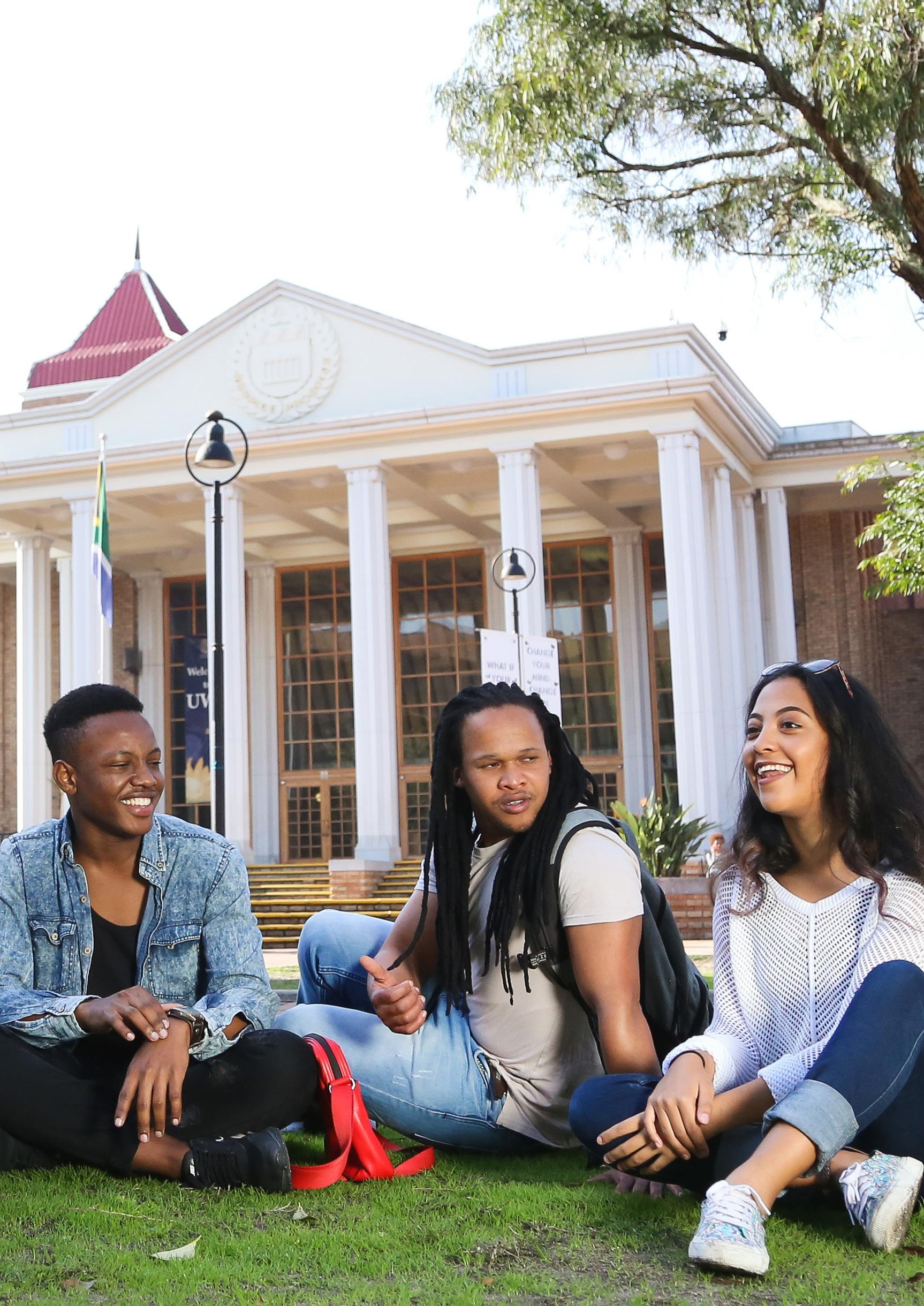
Foreword by the Vice Chancellor
Director: Department of Institutional Advancement (IA), Prof Anesh Singh. One of UWC’s most passionate ambassadors
Donor funds give financially marginalised students access to music programmes
Food Security remains imperative to students academic success
Fundraising in the toughest five years in higher education
Investing in the next generation of scholars and working professionals
Mobile dental clinic brings smiles to many Mediclinic Southern Africa’s partnership with UWC
Mauerberger Foundation Fund Honours UWC Academic Keith Gottschalk
United Way gives missing middle students financial security
Research funds helps UWC investigate schoolbased homework clubs on teacher and learner well-being
UWC staff donate nearly R1 million to student support
CONTENTS 2 3 - 4 5 - 6 7 - 8 11 - 12 19 - 20 9 13 14 15 16 17 21 2 2021 I ANNUAL DONOR REPORT
Alumnus Taj Akleker
FOREWORD BY THE VICE-CHANCELLOR
PROF TYRONE PRETORIUS
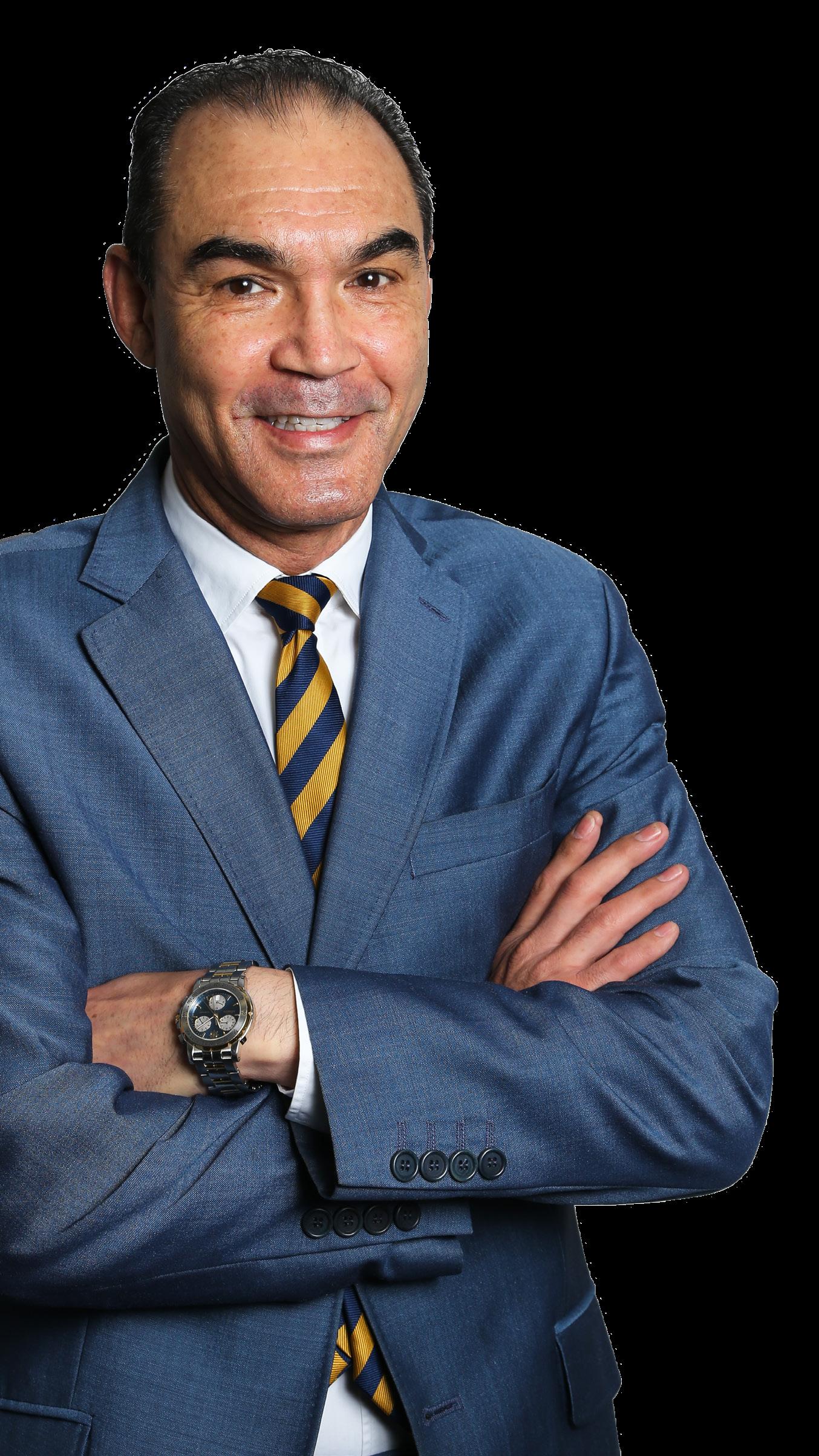
Dear Friends of University of the Western Cape
I hope 2022 has treated you well thus far. Thank you for your continued support of UWC and its academic project. Your contribution greatly assists us in our ability to care for our students and the overall growth and development of the
Since my last letter to you in 2020, the University of the Western Cape (UWC) has reached many positive milestones - in particular the physical reopening of our campuses. While we continue with a blended learning and teaching approach, it is pleasing to see students on campus again, particularly our first-year students.
We recently held our first in-person graduation ceremonies after a two-year hiatus and, as many of you might have experienced for yourselves, there is nothing as inspiring than to watch the joyous celebration of both our students and their loved ones.
I am happy to report that UWC is doing well. Each year, international rankings confirm UWC’s place as one of the top 10 universities in South Africa and this gives us an indication that we are moving in the right direction as an institution of higher learning. But, we are not resting on our laurels. Instead, we continuously strive to improve the university so that we can safeguard it for generations of young people to come.
Last year, we adopted a new Institutional Operating Plan (2021-2025) that will act as a strategic guide for our growth and development across eight goal areas. One of these areas, is the university’s physical expansion. We have been busy with several exciting infrastructure projects, one of which is the construction of a student residence with over 2 700 beds adjacent to the main campus. This is a huge achievement for UWC, especially considering the ever increasing demand for student accommodation. We are able to do this with the assistance of the Department of Higher Education, Science and Innovation.
We are also in the process of creating a new education precinct on the southern side of campus that will give students access to state-of-the-art learning and teaching facilities. There is also the construction of a building that will house our augmented reality and virtual reality facilities as well as the repurposing of a building on Greatmore Street in Woodstock that will serve as an additional space for the Centre of Humanities Research.
As we emerge from the worst of the COVID-19 pandemic, we are mindful of the fact that we must not take anything for granted. Indeed, we must embrace the many positive aspects in our lives and commit ourselves to being and doing the very best that we can.
Since my last note, we have had to say goodbye to our former Chancellor, the beloved Archbishop Emeritus Desmond Tutu who passed away in December 2021. The Arch played such a pivotal role at UWC, particularly during times of enormous strife and turmoil during his 25-year tenure as Chancellor. His legacy will continue to inspire us in our aspirations to improve UWC as one of South Africa’s leading research-led institutions of higher learning.
Finally, I wish to thank you again for being a supporter of UWC, for being there for us during the best and worst of times and for believing in our ambitions and goals to be an excellent university.
2021 I ANNUAL DONOR REPORT 2
OVERVIEW FROM THE
INSTITUTIONAL ADVANCEMENT
PROF. ANESH SINGH
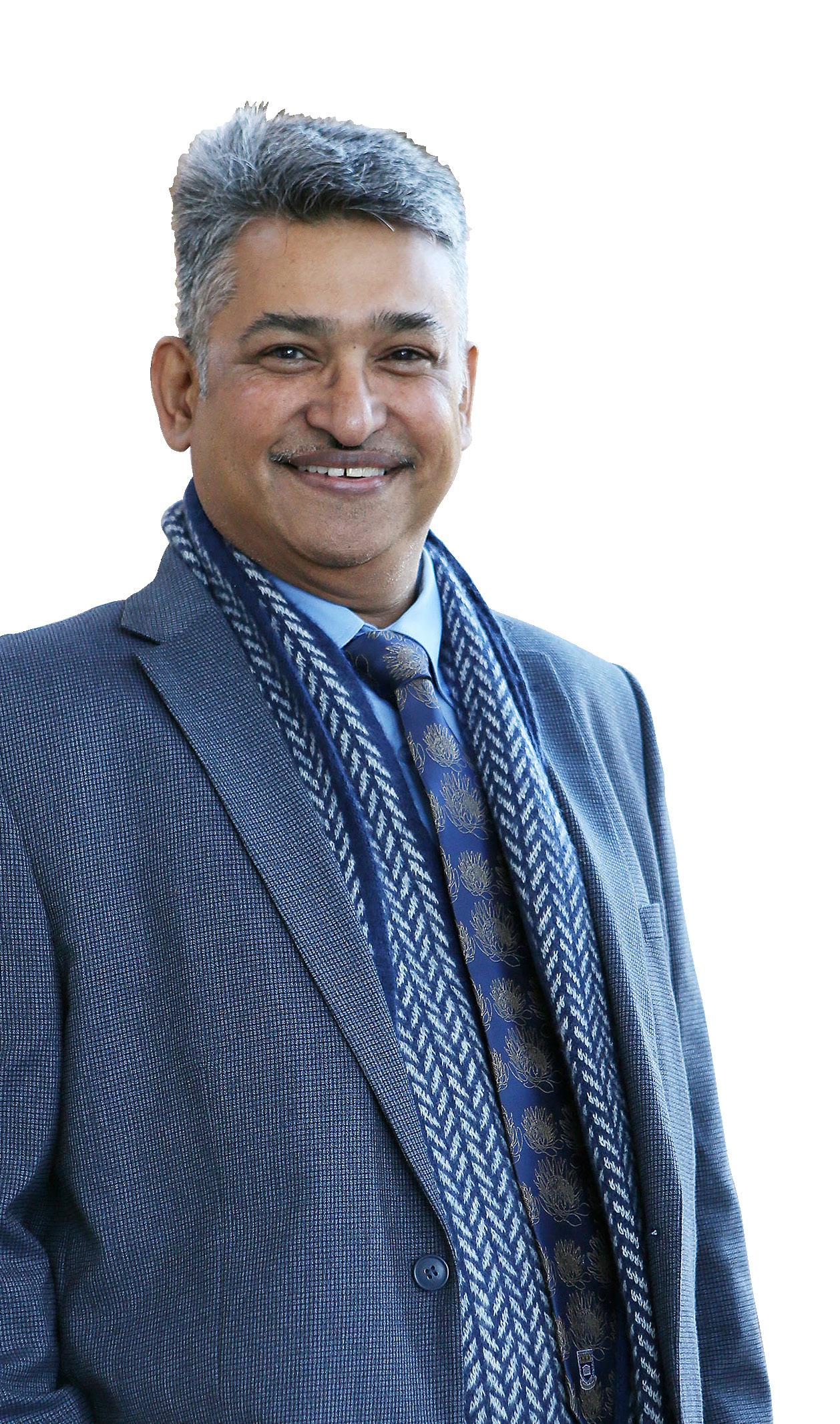
W
hen the Annual Survey of Philanthropy in Higher Education (ASPIHE) was released in 2019 by Inyathelo
- The South African Institute for Advancement - South African higher education institutions had seen a six-year substantial increase of “both gift or grant numbers and funds received” from South African sources, compared to those from overseas. Less than a year later, countries across the world were dealing with
the coronavirus pandemic, COVID-19. South Africa, much like the rest of the world, entered the first of many lockdowns in March 2020 to limit the spread of the virus in the country.
While 2021 initially saw a continuation of what we had endured the year before, the donations we received from corporate and individual donors strengthened the University of the Western Cape’s (UWC’s) ability to assist students to complete the academic year successfully. Some of those success stories are shared in this report – like the R971 994 donated by staff to student support initiatives over the last five years, and the funds we received from United Way South Africa to provide missing middle students with bursaries, in addition to Mediclinic Southern Africa’s funding of 30 bursaries for nursing students at UWC in order to help increase the pool of much-needed nursing staff in South Africa.
As I write this overview, restrictions on movement, interactions, and activities citizens can engage in have been lifted. But the world has changed, and with it the fundraising environment. While the pandemic has affected the higher education (HE) environment substantially, the reality is that many institutions experienced financial challenges long before the pandemic hit. This is due to a number of factors, amongst them shrinking annual state subsidies, a zero percentage increase in tuition fees in 2016, followed by capped increases of no more than 8% in 2017 and 2018, and a 5.5% increase in 2019. COVID-19 only added to the list of risks that universities have to navigate when it comes to sustainability.
The economic fallout from the pandemic has been devastating for businesses and individuals. Many businesses have had to close down while some have been forced to downsize. In addition, many South Africans have lost their jobs or have been left with no other choice but to work for reduced salaries. There is the likelihood that UWC could see a drop in donations from businesses and individuals going forward. The challenge now for Department for Institutional Advancement (IA), and in particular the Donor Relations Office, is how to fundraise in this environment and support UWC’s vision and mission, as well as the goals set out in its new Institutional Operating Plan (IOP).
What is clear is that UWC will have to become quite explicit about its needs to continue to provide its students with academic support and bursaries; conduct critical research; purchase specialised equipment; build needed infrastructure; and, ensure resources like its library facilities are properly equipped. Generating financial support for the university’s
DIRECTOR:
3 2021 I ANNUAL DONOR REPORT
activities as it relates to Goal Area 5 (Financial Viability) of the IOP, is the responsibility of IA. Capital fundraising is a major challenge as it may not resonate with the goals of corporate donors, foundations and trusts. We will be therefore embarking on a capital fundraising drive for unencumbered funds from individuals. Our aim is to seek small amounts from many people over many years.
With the contraction in international donations and the number of local and global institutions competing for the same funds overseas, our strategy at UWC is to have a stronger focus on building meaningful, reciprocal relationships with South African corporations that will benefit our students. The ASPIHE results have shown that in the past, when higher education institutions were in financial crisis following the outcomes of #FeesMustFall, the corporate sector stepped in with financial support. It is this same generosity that we intend to nurture in the interest of UWC.
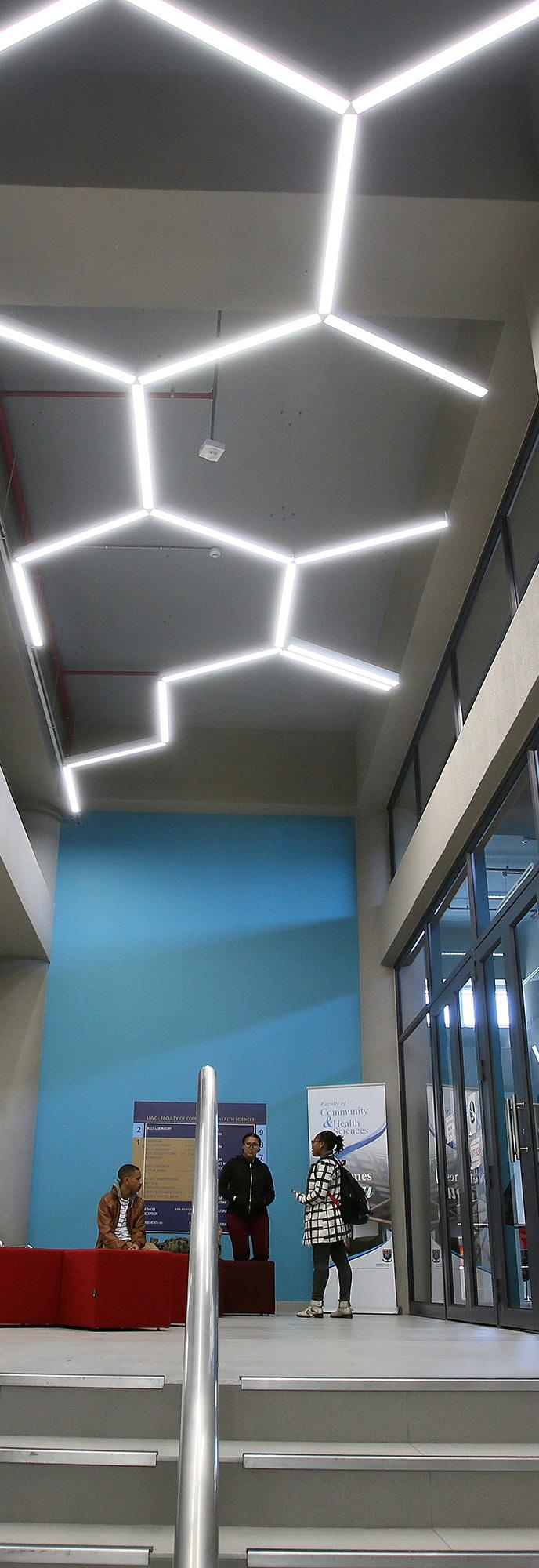
Alumni engagement is an important avenue for ensuring UWC’s future viability. Sharing stories of the impact that alumni’s contributions have had in shaping the institution and its graduates is important as it will hopefully inspire more alumni to give, thereby expanding UWC’s pool of donors. Alumni donors at UWC currently make up a small percentage of donors, but this is not unique to this institution. In fact, it is a phenomenon that many institutions across the country grapple with. This challenge will require UWC’s Donor Relations and Alumni Relations offices to work closely together to increase the pool of alumni who will contribute financially to UWC each month. At the same time, we also need to identify and start conversations with high-net worth individuals who would be interested in supporting the institution, as well as those individuals who wish to bequeath their wealth to HE institutions but have not considered UWC as a beneficiary.
To realise all these goals, we will have to invest heavily in human resources and expand the staff talent pool in the Donor Relations Office. This process started in 2021 with the appointment of Mrs Vera Adams, Manager: Fundraising and Donor Relations and will continue as we further increase our capacity and expertise on the fundraising side. We require this capacity to ensure we have everything we need in place to reach the fundraising targets we have set for the office. After all, developing a strategy and plan without the human resources needed to implement them, leaves us with nothing but hollow intentions and little to no results.
2021 I ANNUAL DONOR REPORT 4
ONE OF UWC’S MOST PASSIONATE AMBASSADORS ALUMNUS TAJ AKLEKER
ourteen years ago, Mr Taj Akleker enrolled for a Higher Diploma in Education at the University of the Western Cape (UWC) at the age of 47. Since then, he has carried the same passion that UWC - an institution that is deeply rooted in the community - fuelled in him into his work at the International Peace College South Africa (IPSA).
Akleker is responsible for Strategic Relations and Donor Management at IPSA, which is based in Rylands Estate. He is also a proud ambassador of his alma mater.
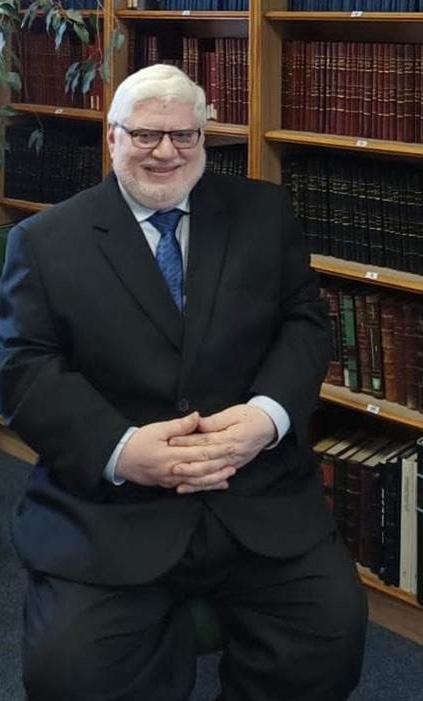
“UWC provided me with the tools to seek knowledge, to engage with theory through critique and with respect, and to seek deeper meaning and understanding through reading, research, and
In 2007, Akleker enrolled at UWC as an undergraduate student through the Recognition of Prior Learning. He says he is “proud to proclaim UWC as his academic home”.
“In my opinion, education is the only way in which humanity can grow and contribute towards addressing poverty and establish communities where shared knowledge not only benefits the individual but extends into communities to the benefit of everyone,” explains Akleker.
His time at UWC only reinforced his commitment to pursuing social justice for all South Africans.
“As young community activists we were always reminded that ploughing back in all facets of our lives was a human duty and not a selected privilege. We were reminded that assisting those who are vulnerable was an intrinsic part of our persona irrespective of race or creed. We were reminded that a character void of empathy for others was a human rights violation. We were reminded that we could gain freedom from all oppression, which sought to make us lesser beings, through lifelong learning and education,” he says.
These words also form the basis of his commitment to give back to UWC in as many ways as he can.
“While UWC obtains funding through the Department of Higher Education and Training and from its donor community that consists of various corporates, I believe that alumni ploughback is just as critical. I see so many young graduates who are committed to ensure that UWC grows and maintains the quality of education it offers to students, develops excellence in all its faculties through cutting-edge research, and produces ethical leaders with dignity, humanity, and empathy,” adds Akleker.
5 2021 I ANNUAL DONOR REPORT
According to Ms Vera Adams, Manager: Fundraising and Donor Relations within Institutional Advancement, philanthropy can be best summed up as generosity provided through gifts of “time, talent, and treasure”.
“Mr Akleker is an example of an alumnus who has given selflessly of his time and energy to help the university raise its profile in the community. His time at UWC has had such a profound impact on his life and today he invests everything he has learned back into his community,” says Adams.
In 2019 and 2020 alone, more than 200 students benefitted from donations made by alumni and staff.
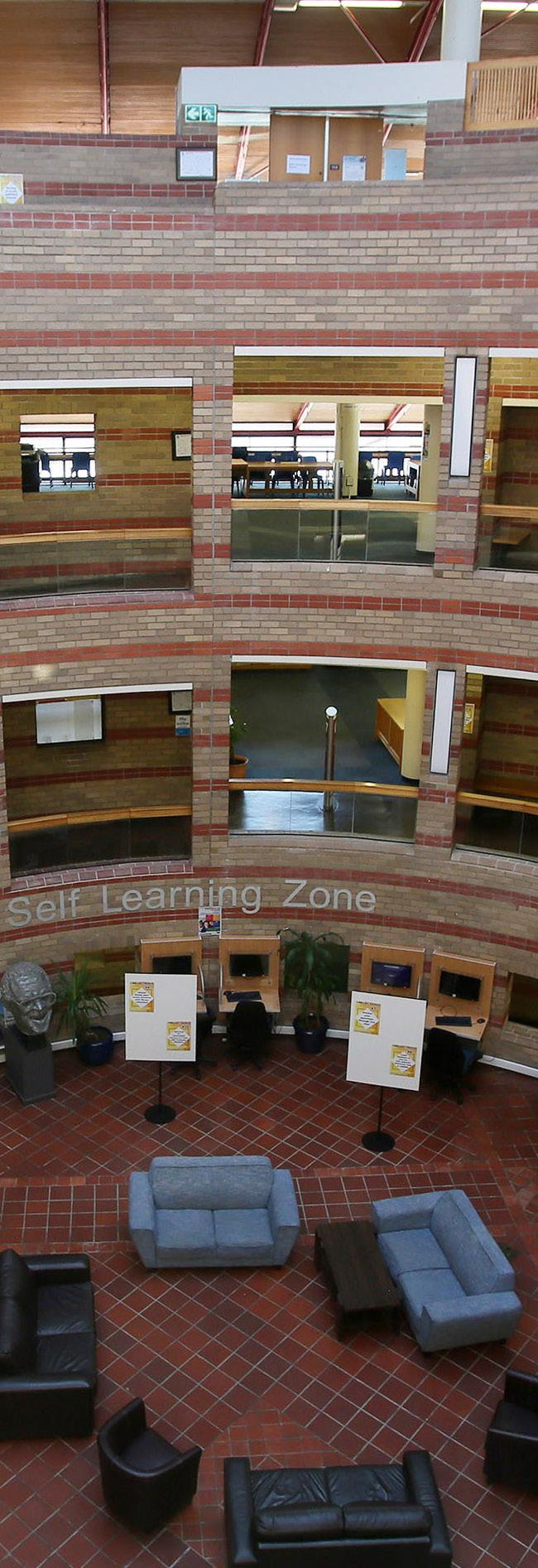
“Through the institutional fundraising mechanism ‘Access to Success’, more than 200 students with nominal debt were granted permission to graduate in 2019 and 2020,” says Niven Maree, UWC’s Alumni Relations Manager.
The Access to Success campaign is managed by the Alumni Relations Office and encourages alumni and staff to support students by contributing financially to the institution to assist students who are academically deserving but in need of finances to complete their studies.
“Students’ notional debt was paid from the fund, which was made up of financial gifts from alumni and staff,” he adds.
Throughout Akleker’s many years as a philanthropist and an ambassador for UWC, he has not only provided financial support to his alma mater but has publicly spoken about the benefits of a UWC education.
Maree echoes this sentiment and says that graduates are more motivated than in prior years to participate in the teaching and learning aspects of university life.
“This could happen in a variety of ways, but the Alumni Office is currently focusing on alumni who are able to volunteer their time to mentor young graduates.”
Adds Adams: “Mr Akleker’s contributions to UWC demonstrate that giving back is not only about donating money to support various initiatives at the university, but that alumni can make an equally important impact by becoming ambassadors for UWC locally, nationally and across the world.”
2021 I ANNUAL DONOR REPORT 6
DONOR FUNDS GIVE FINANCIALLY MARGINALISED STUDENTS ACCESS TO MUSIC PROGRAMMES
Thanks to ongoing contributions from the Myra Chapman Education Trust (MCET) and the Wendy Ackerman Trust, financially marginalised students are able to enrol for music programmes at the Centre for Performing Arts (CPA) at the University of the Western Cape (UWC). These contributions make it possible for the CPA to offer students bursaries that partially fund their tuition costs.
Tuition fees, which amount to R12 000 per registered student, are funded by the MCET to cover weekly individual practical tuition, while group rehearsals for ensembles in preparation for events are funded by the Wendy Ackerman Trust. The CPA received R200 000 in total from both donors in 2021 and has been able to fund 20 students and two ensembles, namely the UWC Jazz Combo and the UWC Community Chamber Choir.
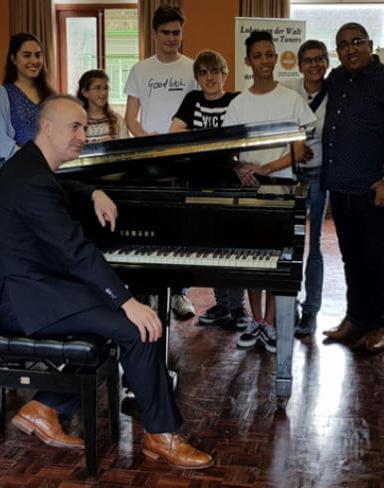
The bursaries are available to all students in need of financial assistance irrespective of the course for which they are registered. In the 2021 financial year, 18 students were funded.
The Centre was established in 2005 and offers two accredited music courses, namely the Intermediate Programme in Music and the Advanced Programme in Music. The programmes are geared towards “the training and development of community music practitioners”.
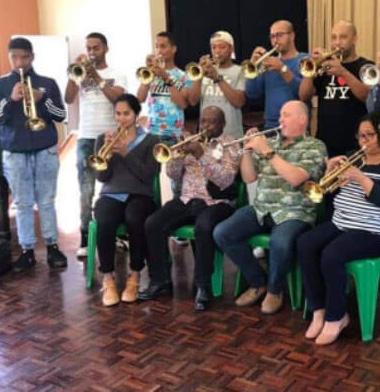
“However there are increasing requests from primary and high school learners who are interested in music tuition as well as matriculants who do not meet the requirements to do music programmes at neighbouring institutions. At UWC, these students are able to continue their music tuition while enrolled for other programmes at various faculties and departments on campus,” explains Ms Henriette Weber, the Director of the CPA.

According to Weber, “there is no lack of talent in communities”.
“But you know, and we have witnessed, parents often say that you need to put food on the table and you need to be employable. The COVID-19 pandemic has taught artists that
7 2021 I ANNUAL DONOR REPORT
they need to be multi-dimensional, including community music practitioners. UWC’s connectedness to communities is an advantage as community engagement is part of our DNA. As the Deputy Vice-Chancellor: Academic always states: ‘Community Engagement is not a soup kitchen or handout to communities, but true engagement’. We pride ourselves on this fact.”
This engagement helps the CPA to create programmes that develop practitioners personally, and equip them to unearth talent in their communities and prepare learners to apply for the CPA programmes.
“By finishing these programmes, they can advance to music degrees offered by other universities,” adds Weber.
For many music practitioners and musicians from marginalised communities, acquiring a music degree is challenging. The first hurdle they need to overcome is a lack of access.
“Lack of access to music programmes is twofold; firstly, the costs related to music education, which entails tuition fees and access to an instrument on which to practise and perform. Secondly, the current music education programmes provided by schools within the Western Cape Education Department start with instrumental tuition in Grade 8,” explains Weber.
“It is humanly impossible to reach Grade 7 in music within the five years of high school and thus marginalised learners are unable to meet the entry requirements to enter a music degree programme at any higher education institution in South Africa. A bridging course via certificate courses and programmes are required.”
However, what sets UWC apart from other institutions offering the same programmes, says Weber, is the institution’s understanding of the needs within various communities within the Western Cape and other provinces due to how it pursues community engagement.
“The whole ethos behind the centre and why the courses were designed was to ensure that the engagement with the community was authentic and that the CPA addressed the needs of music practitioners at grassroots level,” she adds.
Another challenge for students from marginalised communities, who have a backlog when entering degree programmes, and who have done bridging courses, says Weber, is the difficulty they experience in making the transition between the course and their first year of study, with many dropping out in that time .
“We have accepted students into the CPA programme to develop their skills and training and regain their confidence as performers. Creating this positive environment will enable them to be successful wherever they find their next space – on stage or in a lecture hall, for example.”
For many years, Weber has had concerns about bridging programmes that do not respond to real community needs.
“It feels like we are making people swim around and around in the swimming pool with a certificate course, but they are never going to get an opportunity to get out of the pool, and get to that next phase of musical training.”
Weber, whose family lived through forced removals, has navigated this legacy by working to create better opportunities for marginalised communities.
In 2003, Weber was appointed as the Outreach and Education Manager at the Cape Philharmonic Orchestra to start a youth orchestra and wind ensemble. Weber returned to UWC in 2011 as head of the Centre for the Performing Arts, and since then has continued to create opportunities for community musicians to engage within a professional environment.
Like many music practitioners, Weber has the degrees and skills to teach music at a professional level, but she says, there are many music teachers in communities that “probably have better skills and experience than the professionals, but are precluded due to not having a degree”.
“The CPA has the backing of the DVC: Academic, who supports our vision to do something different and meaningful. We have started the process of developing musical talent through the two programmes offered at the CPA, but there are also new initiatives which will soon be rolling out and look at other opportunities for artists to develop and ‘own’ their art.”
The facilities at the CPA will also be refurbished and upgraded to meet the academic needs of the students.
Weber says that the programmes the CPA offers to its beneficiaries are good examples of how the centre is helping UWC reach one of its core goals, which focuses on learning and teaching.
“Student success is a key component of UWC’s Institutional Operating Plan together with research. Many of our new initiatives are grounded in research. Our mission is that no artist should be dying a pauper in future. The CPA wants to empower artists to ‘own’ their arts, and make money from their talents and
2021 I ANNUAL DONOR REPORT 8
FOOD SECURITY REMAINS IMPERATIVE TO STUDENTS’ ACADEMIC SUCCESS
Food security is integral to students’ academic success. As the phrase goes, “you can’t teach a hungry child”, or in this case, a hungry student. Research has shown that hungry individuals do not only struggle to take in and retain new information, but also struggle with poor concentration, and the ability to make good progress in their learning.
This is a reality that the University of the Western Cape (UWC), along with a few other institutions, have understood for many years, long before student hunger became a national concern for all South African universities.
“This is how we have always framed UWC’s nutrition and wellness support project, as an initiative that enhances academic excellence and encourages active co-curricular involvement,” says Mr. Khaya Magopeni, Executive Assistant in the Office of the Deputy Vice-Chancellor (DVC): Student Development and Support (SDS).
In 2019, UWC decided to strengthen its response to food security and student nutrition on campus through a coordinated and holistic institutional approach that involves various student support environments as well as external donors. An institutional task team was appointed with the mandate to develop a model that took into consideration the lived realities of students. Findings from a multi-disciplinary research project focused on student hunger were also taken into consideration.
Since then, the SDS, under the leadership of the DVC: SDS Prof Pamela Dube, has been working with other university departments and external partners to ensure there is a coordinated institutional approach to address student nutrition and food security challenges sustainably.
While the Covid-19 pandemic has placed additional pressure on the resources available to address student hunger – such as an increase in the number of students seeking nutrition support –UWC has managed to help students who required assistance says Magopeni. This is thanks to ring-fenced funds being made available by the institution and continuous support from longstanding partner and donor, Tiger Brands, as well as ad hoc support from Shoprite Checkers.
“The relationship with our partners and donors remained intact even with businesses continuing to take a knock in 2021,” explains Magopeni.
According to Magopeni more students had returned to campus and private accommodation in 2021 in spite of classes continuing to be presented online. This compelled the institution to find ways to safely distribute food items and personal hygiene products on and off campus.
Magopeni is extremely grateful to businesses who continued to support UWC in spite of the financial pressures they too were experiencing in 2021, especially as between 800 to 1 000 students rely on this support each month.
“We had to deal with a very interesting dynamic as we did not only have to consider where our students were living when it came to the distribution of items, but also take into account whether we could ensure social distancing while distributing food parcels. We could not have students gathering in one place without the clear protocols,” says Magopeni.
Food parcels were therefore dropped at the doors of students living in private accommodation and were also delivered to students at various university residences.
This was also done to protect students’ dignity and human rights, adds Magopeni, principles that are at the core of how the university provides nutritional support to students.
Other initiatives that address student hunger at UWC are created with the goal of creating an empowering environment for students. One such example is the Student Resource Exchange Programme that has been implemented by the institution’s Residential Services to allow students to exchange their skills in return for the desired support. Thanks to the programme, a student who lives in residence and excels in accounting, for example, can tutor another student who may be struggling with the subject.
9 2021 I ANNUAL DONOR REPORT
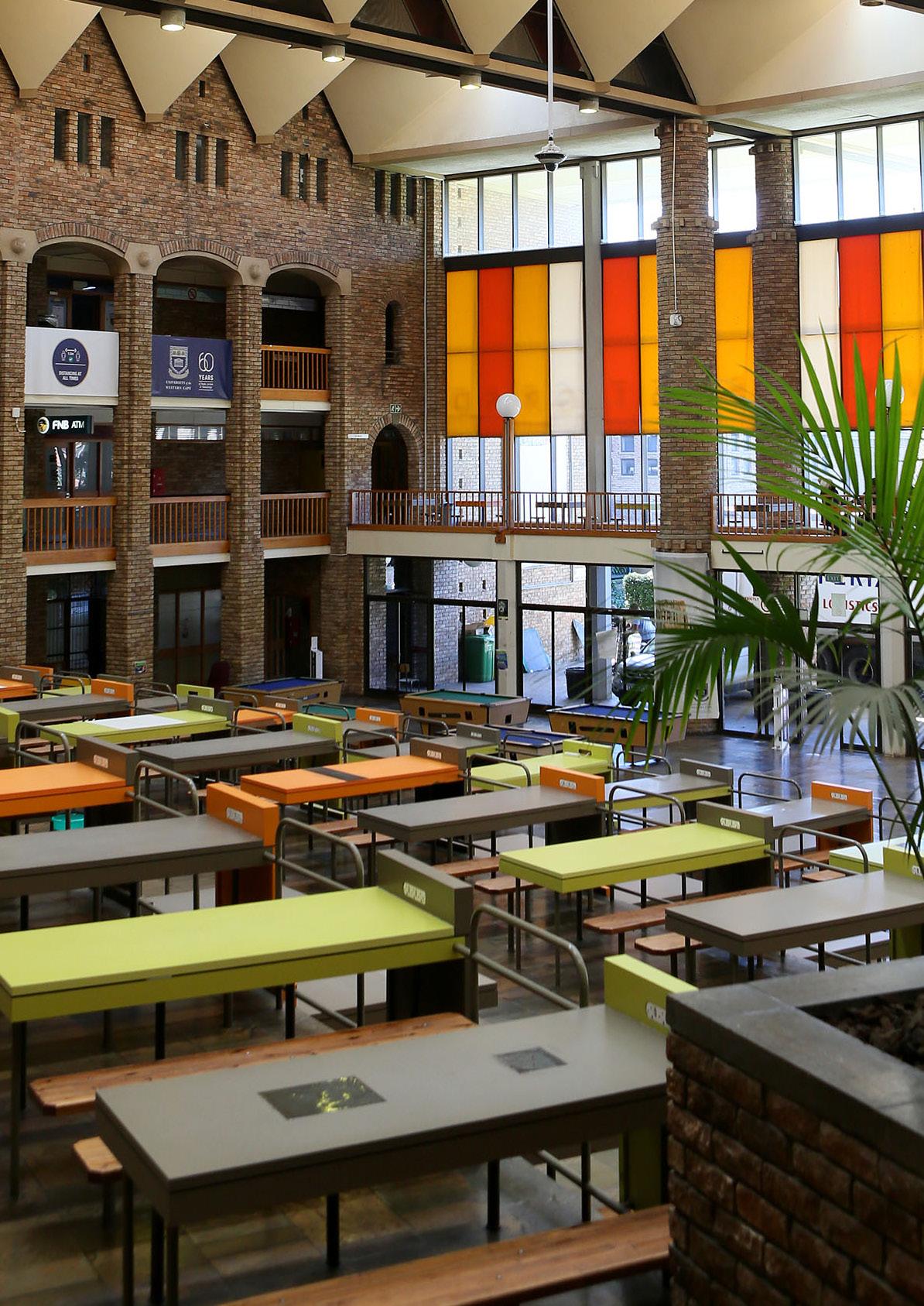
2021 I ANNUAL DONOR REPORT 10
FUNDRAISING IN THE TOUGHEST FIVE YEARS IN HIGHER EDUCATION
Since 2016, universities in South Africa have faced many challenges to retain a strong bottomline - from dealing with the financial impact of fee-free education for students from households that earn R350 000 per year and less, declining higher education budgets from government, and caps on percentage increases on student fees. The COVID-19 pandemic added to the financial pressure with universities forced to dip into their own coffers to finance the move to online learning and a rise in student debt as households struggle to make ends meet in a declining economy.
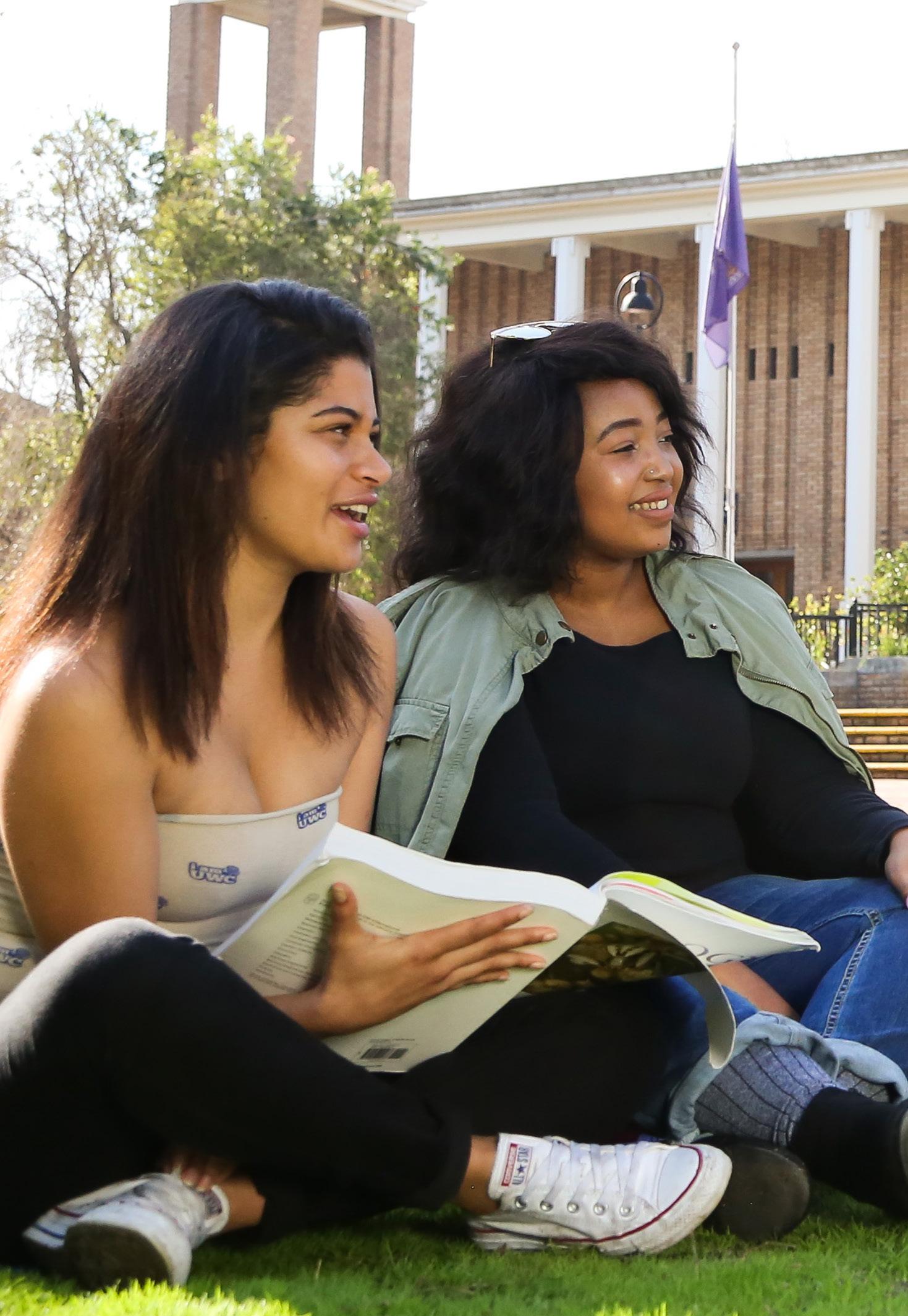
According to Mrs Vera Adams, Manager: Fundraising and Donor Relations within the Department of Institutional Advancement (IA), higher education institutions and those tasked with fundraising within universities are currently working in an environment where budgets continue to shrink and donor funds have to be strategically utilised and stretched further.
“We have been through one of the toughest periods the higher education sector has ever experienced. We faced a lot of challenges, but we are grateful for the financial and in-kind support from long-term, current donors as well as new donors who came onboard during this period. Thanks to our donors and funding from the university and the UWC Foundation Trust, we were able to make sure that no student was left behind by providing students with electronic devices and data when the lockdowns came into effect,” explains Adams.
“I also believe that the institution’s ability to deal with the challenges posed by the COVID-19 pandemic since 2020 is testament of its resilience developed during six decades of existence.”
“As one of the top top tier South African universities, effective planning and management allowed UWC to move over to online teaching and learning relatively easily. There were obvious challenges, like supplying students with laptops and data to attend online classes, as well as supporting our students emotionally and academically, but we managed to make the transition to online learning. Thanks to this, the quality of education and the curriculum were not affected,” says Adams.
Since joining UWC in April 2020, she has witnessed how staff within the Donor Relations environment became more innovative and creative in their fundraising methods by using crowdfunding platforms and virtual golf days to raise funds.
“During this time we worked on maintaining relationships with our donors and also sharing some of the things that UWC has done with the funds it received. For example, we have developed new courses, like the Postgraduate Diploma in e-Skills offered in
collaboration with an international software developer, while our Department of Computer Science was able to continue exploring the viability of using augmented and virtual reality technologies in the South African agricultural sector thanks to a donation from the Western Cape Department of Agriculture.”
“More and more donors are starting to invest in skills development, in particular specialised areas that address the future challenges presented by the Fourth Industrial Revolution.”
UWC is the first university to collaborate with a software developer to create the e-Skills diploma. In addition, its unique selling points – like being a leader in community health services and having an internationally renowned Faculty of Dentistry – are also big draw cards for donor investments.
In 2021, funding received from donors ensured that postgraduate students, who fall within the ‘missing middle’, were able to continue their studies with all costs related to their studies covered. These donations allow UWC to continue to pursue its commitment to providing access to higher education for all deserving students.
11 2021 I ANNUAL DONOR REPORT
“Our focus is not only on monetary support,” says Adams. “We also want to create mentoring support [opportunities] for our current students in collaboration with our alumni. We receive funding for all kinds of student support and needs, and donors are now also looking to invest in mental wellbeing, psychosocial support, food security and work readiness programmes.”
In addition, many alumni have played a critical role in promoting UWC as a leading higher education institution that offers excellent degree programmes and “a vibrant intellectual space where people engage with matters of real significance” . Thanks to these ambassadors, says Adams, UWC has become known in sectors they have not previously featured.
“We have highly placed alumni, some of whom are CEOs of companies and they belong to big networks where they talk about UWC and what we have to offer and encourage investment through donations. We also have a huge group of international ambassadors as far as Dubai, and these alumni reach out to find out how they can help UWC from where they are,” adds Adams.
The university has also received support from the University of the Western Cape (UWC) Foundation Trust (previously the UWC Development Fund), in particular during the last six years. The Trust is a formal legal entity and a registered non-profit organisation that operates independently. The Board of Trustees consists of influential individuals who are tasked to find, secure and grow donations to be used by the university. They also ensure that sound governance practices are applied and that funds are properly administered.
At present, the Trust has accumulated R110.4 million in investment funds and also finances and/or provides seed funding for many critical student-focused projects, initiatives or needs. In 2020, the Trust provided R7.5 million to UWC for its #NoStudentWillBeLeftBehind fundraising campaign, which ensured that 6 000 students received laptops and 15 000 received data each month in 2020.
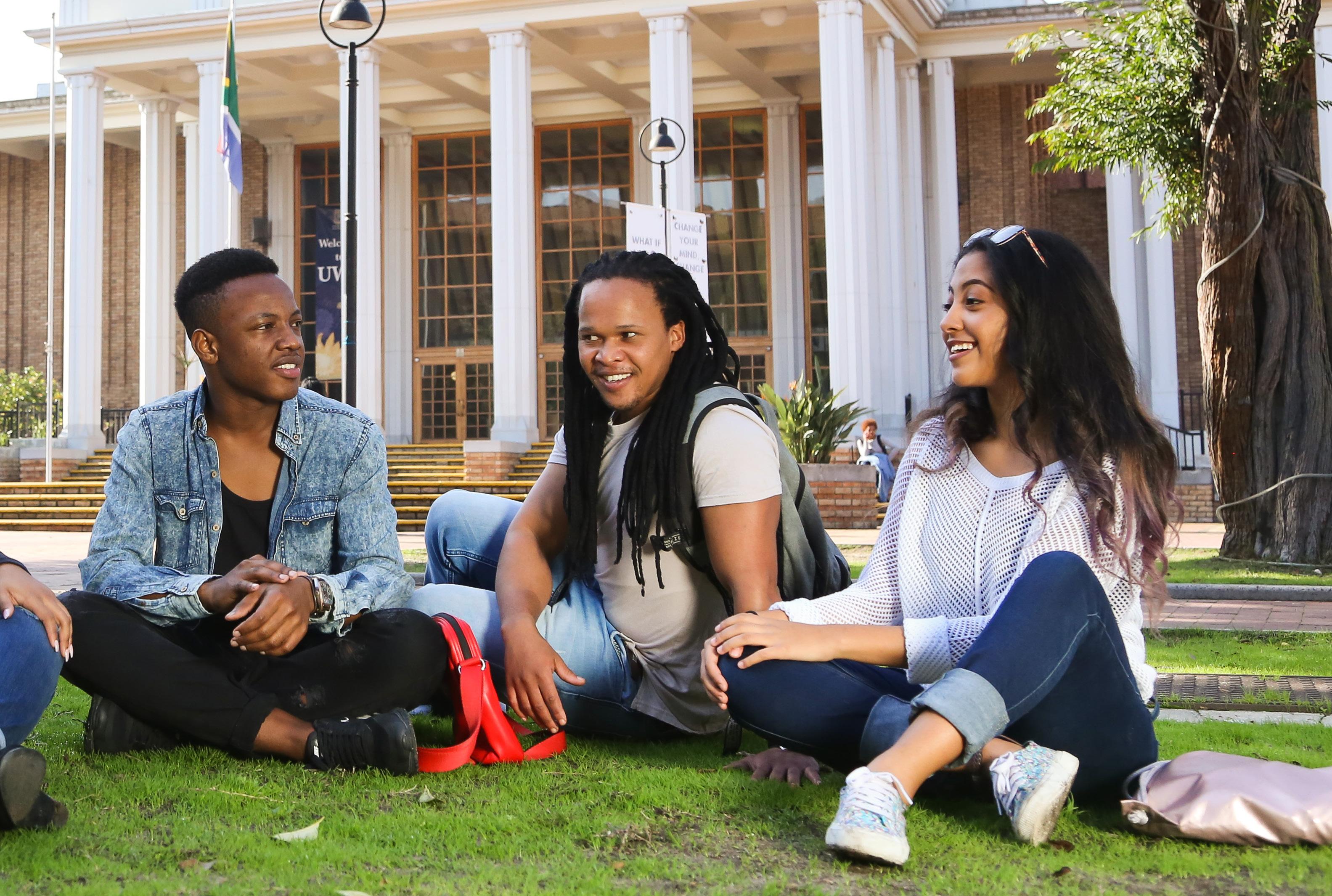
The Trust was chaired by Dr Fred Robertson, Executive Chairman of Brimstone Investment Corporation Ltd., from May 2012 to December 2021. During his time as Chair, Robertson made many contributions to the development of UWC and its students, including providing rugby kits and nutritional support to UWC’s Varsity Cup rugby team and donating 100 000 Brimstone shares to the Trust.
“On behalf of UWC, its Executive Management, staff, students, alumni, donors, partners, and members of the Board of Trustees, I want to thank Dr Fred Robertson who served as Chairperson of the UWC Foundation Trust. Dr Robertson served the university until the end of 2021. His stewardship of the Board of Trustees saw the university celebrate many milestones contained in its Institutional Operating Plan (IOP) 2016-2020. We are grateful for the contributions Dr Roberstson made to UWC through the Trust and that the Trust could draw on his expertise, knowledge, and networks for many years,” says Prof Anesh Singh, Director: Department of Institutional Advancement.
2021 I ANNUAL DONOR REPORT 12
INVESTING IN THE NEXT GENERATION OF SCHOLARS AND WORKING PROFESSIONALS
During the 2021 academic year, the University of the Western Cape (UWC) allocated around R900 000 in donor funds to postgraduate students to cover their registration, tuition, travelling and accommodation fees as well as the costs of textbooks and food, and the provision of research allowances.
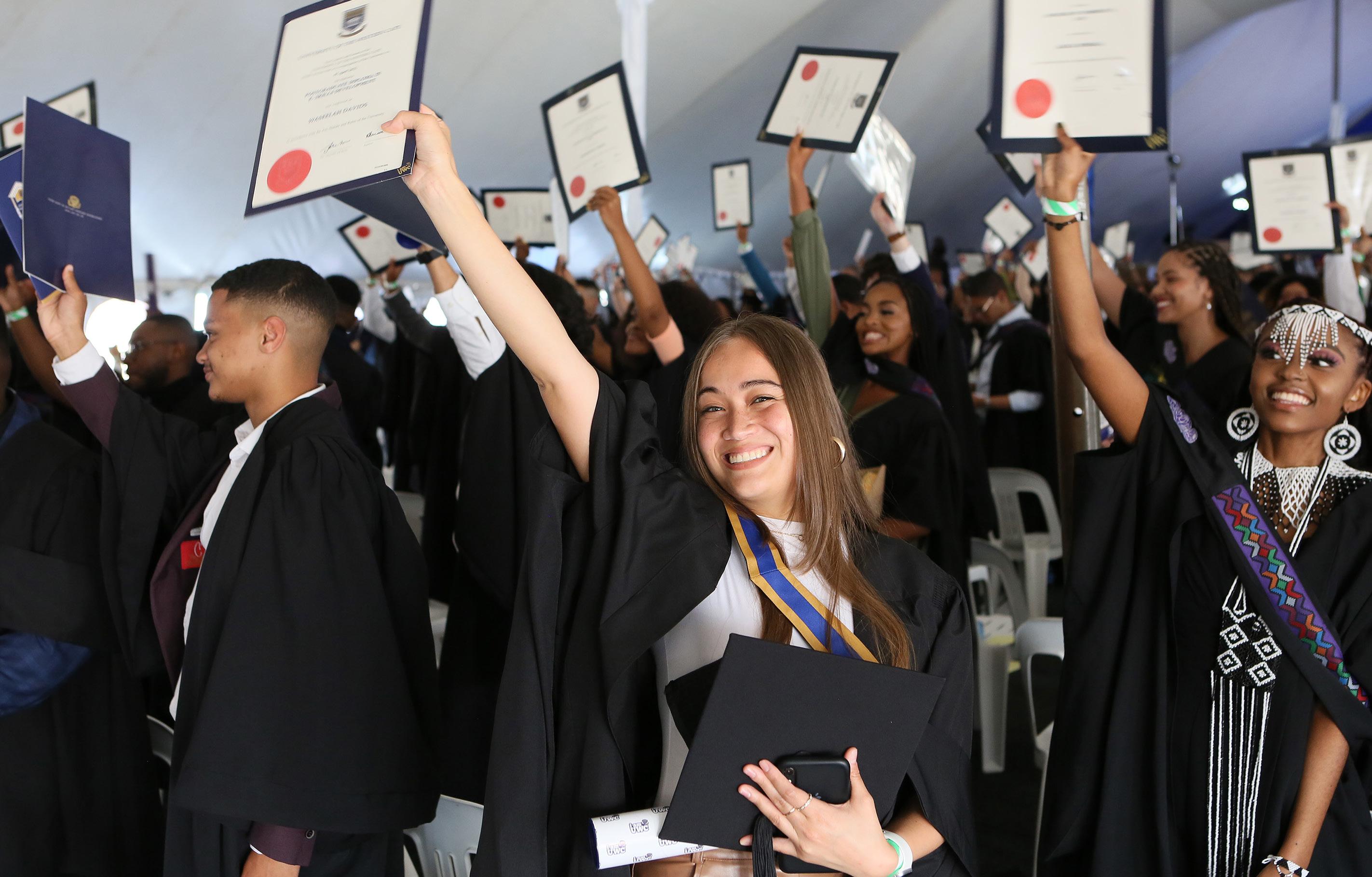
Many of these postgraduate students fall within the ‘missing middle’, which refers to students who cannot afford to pay for a higher education programme, but who also do not qualify for funding through the National Student Financial Aid Scheme (NSFAS).
In recent years, the media has reported widely on the plight of ‘missing middle’ students who are finding it increasingly difficult to secure funding and often have to resort to high-interest loans at private financial institutions to cover their studies.
“The funding covered my tuition fees and it relieved me of the burden of having to take out a student loan, which my parents also could not afford. It allowed me to focus on my studies without the worry of finding a full-time job to cover the costs of my studies.”
This is how Ms Lauren Koopman describes the impact that donations made to UWC has had on her future plans and her ability to continue her studies in the first place. Koopman is in her final year of a Masters degree in Psychology and is that much closer to achieving her dream of enrolling for a PhD and eventually becoming for an academic.
The cost of university studies is often cited as a stumbling block for many South African youth who qualify for tertiary education.
In light of this, financial donations made to the university allow UWC to generously fund students who do not qualify for financial assistance and may not even qualify for a loan.
“The postgraduate student funding helped me a lot when I was stressed during the pandemic about who would help me cover my accommodation fees. The funding helped me so much that my family didn’t have to get loans,” says Mr Lawrence Nodayinge, who is enrolled for a Master of Arts (Psychology) programme.
His passion for psychology is influenced by his personal experience of the impact that a powerful therapeutic relationship can have on an individual. By focusing on his own mental wellbeing, Nodayinge has gained a deeper understanding of the importance of self-reflection, and he hopes to help his future clients apply this practice when he graduates and becomes a registered psychologist.
For Mr. Wade Kerspuy, the postgraduate funding allowed him to start his Masters degree in Physiotherapy. According to Kerspuy, he always wanted to do a Masters, but he was never in the position financially, to do so. In addition, the funding he receives also covers research and software costs as well as equipment he needs for his research.
The university’s investment in postgraduate students contributes to its long-standing commitment to providing access to higher education and affording students every opportunity to excel in their studies, as stipulated in its Institutional Operating Plan (IOP). In this regard, the university appreciates the donations that make these student support measures possible.
13 2021 I ANNUAL DONOR REPORT
MOBILE DENTAL CLINIC BRINGS SMILES TO MANY
We have a wonderful opportunity: communities need our services and our students need a community to serve with their skills. It also provides us with an opportunity to gain experience in providing services to community members that cannot be treated in the Dental Hospital. Although the services provided are mainly after hours, we never have a shortage of students volunteering to participate.”
This is how Prof Rob Barrie, Project Leader of the mobile dental clinic in the Faculty of Dentistry at the University of the Western Cape (UWC) describes the benefits of the mobile clinic to both students and communities.
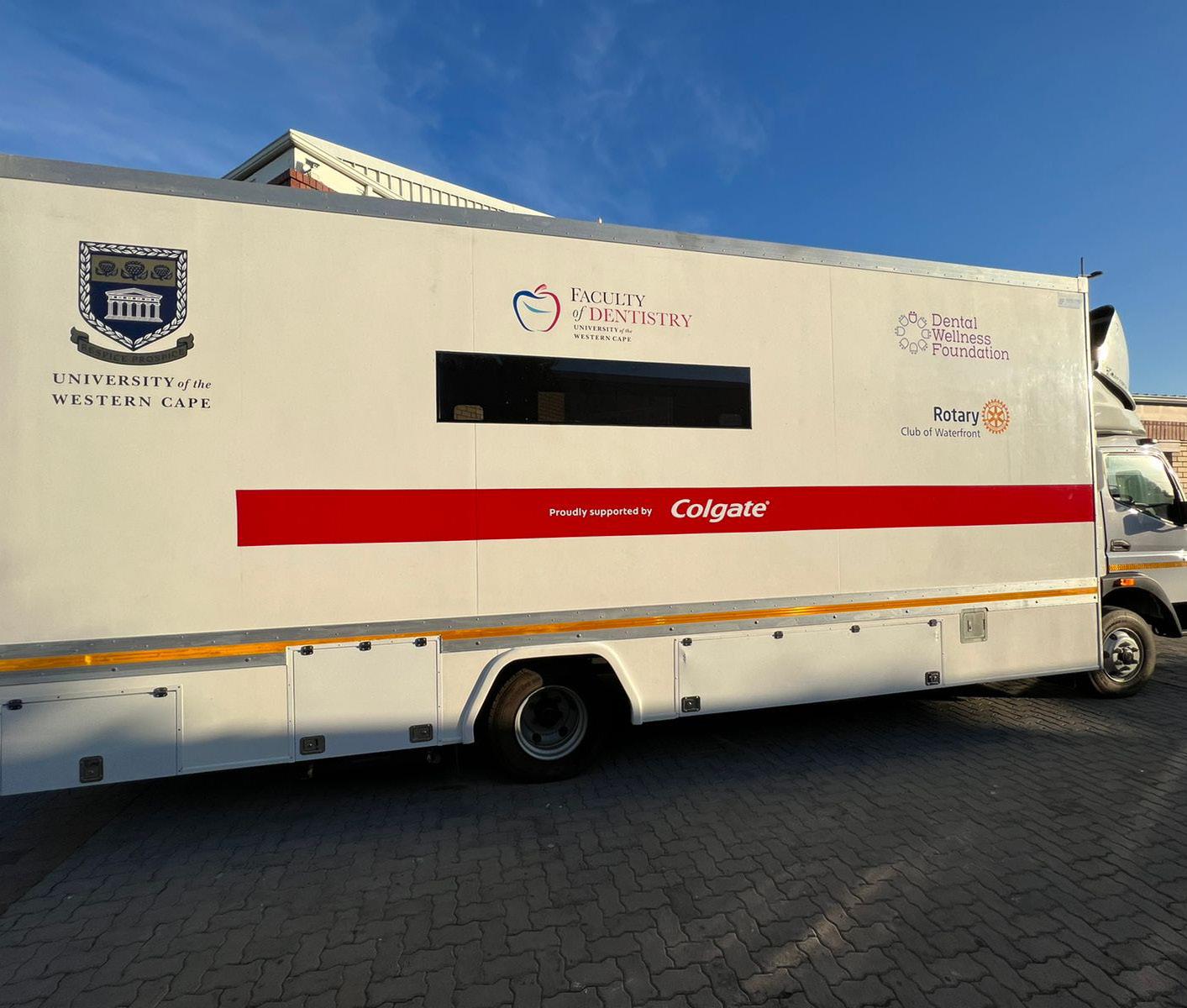
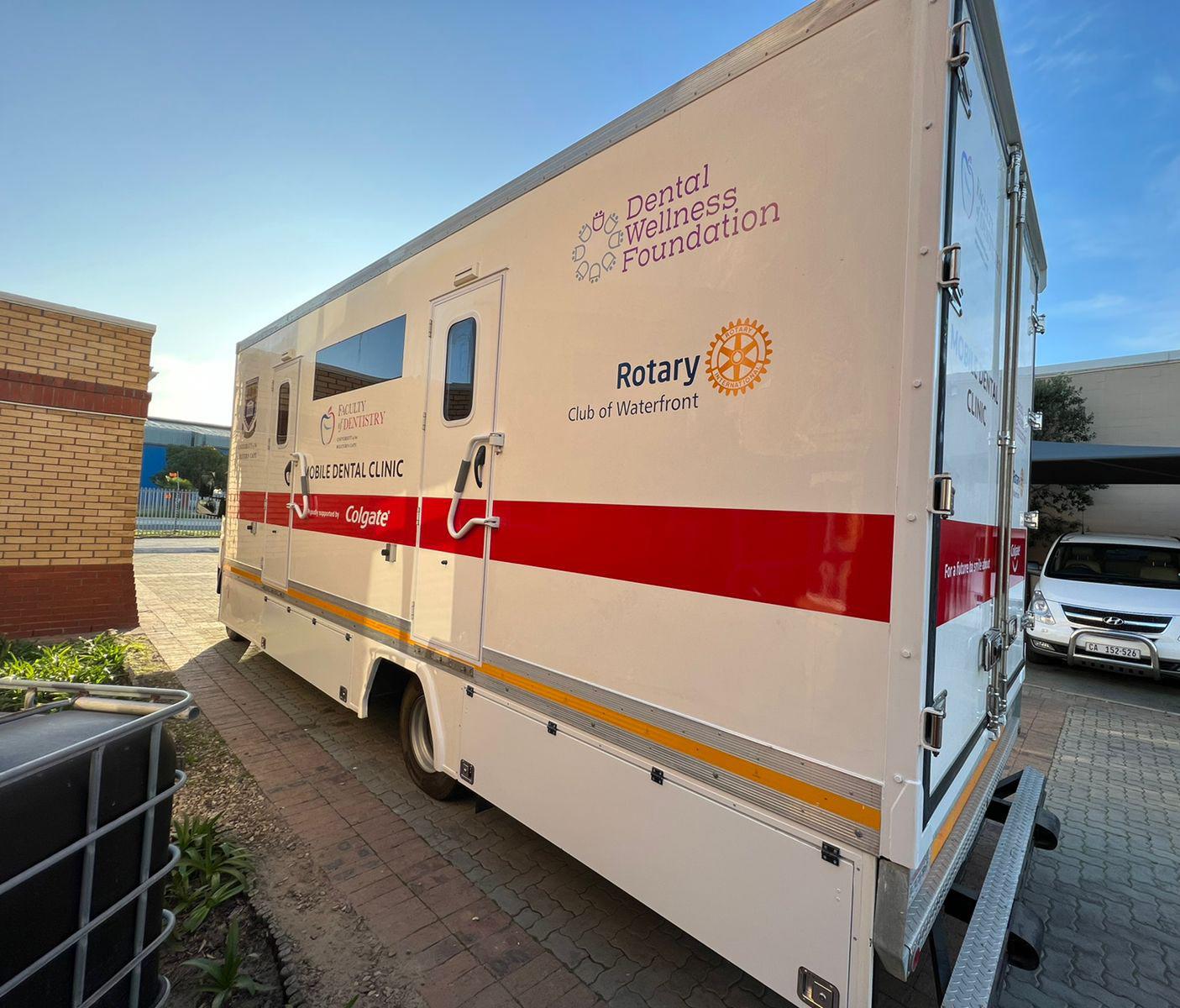
Dental care is generally expensive, with low and middle income communities finding it unaffordable. In an effort to respond to the need for free professional dental services in local communities, the Faculty of Dentistry started a mobile dental clinic project in 2019, servicing communities in and around Cape Town.
The new mobile dental clinic will replace the existing 44 year-old mobile clinic owned by the faculty. This project was funded by generous donations from Colgate Palmolive South Africa, who has contributed R1 million since 2019, and the Rotary Club of Waterfront, the Rotary Club of Cardiff and the Dental Wellness Foundation, who donated close to R500 000 in total since 2019.
The donations enabled the faculty to buy a truck and convert it into a mobile dental clinic.
“The clinic is actually a six ton Fuso truck with an extended chassis. The cargo box, which is 7 metres long, was converted into three dental surgeries,” explains Barrie.
The mobile dental clinic project has two objectives: to serve as a supervised environment in which fourth and fifth year dental students can receive their clinical training and to take muchneeded dental and other oral health services to communities in need.
The communities being served include Fisantekraal, Bottelary Primary School and Kraaifontein. The dental clinic typically operates on the premises of an existing clinic, for example, the Kraaifontein Community Health Clinic or a school, for example, Bottelary Primary School.
“We also have outreach weekend clinics, usually five times a year and the need for dental services is so great we could go almost anywhere in the Western Cape. We have been to Ceres, Piketberg, Montagu, Riebeek Kasteel, Prince Alfred Hamlet, Rawsonville, Fisantekraal, Tulbagh, Hangberg, Du Noon, Vredenberg and other towns over the past years,” explains Barrie.
Students who work in the dental clinic participate in outreaches to these communities as a once-off event, but are also involved in regular visits to other communities. The dedication and care with which the fourth-year dental students, who visit Bottelary Primary School every Tuesday morning, do their work does not go unnoticed by the school management.
“The dental services provided by the UWC students play a critical role in the oral hygiene of our learners. The majority of parents cannot afford medical aid or private dentists and transport to health services has always been a challenge in this community. Now we have the privilege of receiving professional dental care at our school. For that, we are extremely thankful,” says Mr. Ivan Crawford, Principal at Bottelary Primary School.
“ 2021 I ANNUAL DONOR REPORT 14
MEDICLINIC SOUTHERN AFRICA PARTNERSHIP WITH UWC TO ENSURE MORE NURSES ARE TRAINED
Mediclinic Southern Africa realise that there is a shortage of nurses in the health sector, and for this reason we are committed to giving financial assistance to prospective nurses and allocate an annual budget for tuition fees and associated costs for nursing students at UWC”.
These are the words of Ms Avril Stroh, Training and Development General Manager at Mediclinic Southern Africa, about its investment in bursaries for nursing students. In 2021, the School of Nursing in the Faculty of Health and Community Sciences at the University of the Western Cape (UWC) once again received a generous donation from Mediclinic Southern Africa to fund 30 undergraduate nursing students.
“Now more students can complete their studies without the burden of paying tuition fees,” says Stroh.
According to Stroh, Mediclinic Southern Africa is committed to advancing the healthcare sector in South Africa and is doing that by forming partnerships with higher education institutions and making donations to institutions across the country.
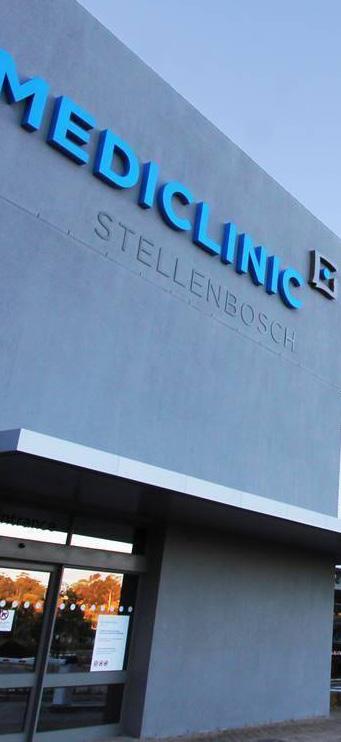
“We have sponsored students for many years, but it was always limited to four or five bursaries a year. In the last three years, we have increased our commitment drastically and now, we aim to allocate 60 bursaries a year,” adds Stroh.
One of UWC’s Institutional Operating Plan focus areas for the period 2021 - 2025 is to increase its student support measures with a specific focus on providing bursaries and other forms of financial assistance to students.
The impact of the funding in the lives and on the futures of beneficiaries has already been considerable.
“In August of last year, I got the good news that I was awarded a bursary from Mediclinic. The bursary covered the balance of my tuition fees and I received a full bursary for this year. I appreciate this bursary very much,” explains final-year nursing student, Ms Ketsia Musema-Mushiya.
Musema-Mushiya says her career choice happened “naturally” ”because she was always fascinated with the human body and could never see herself working in any other profession. “I have learnt so much about myself during my clinical trials. Eventually, I would like to do a masters degree but first, I want to finish my studies and work for a while,” says Musema-Mushiya.
Mediclinic Southern Africa welcomes enquiries about funding opportunities in the nursing and pharmacist professions. Prospective and current students who are interested in these careers and who are in need of funding, are encouraged to visit www.mediclinic.co.za for more information.
“ 15 2021 I ANNUAL DONOR REPORT
MAUERBERGER FOUNDATION FUND HONOURS UWC ACADEMIC KEITH GOTTSCHALK
The Mauerberger Foundation Fund (MFF) has established the Keith Gottschalk African Integration Award to honour the contribution of Mr Keith Gottschalk to South African politics and political studies. The Department of Political Studies in the Faculty of Economic and Management Sciences (EMS) at the University of the Western Cape (UWC) will manage the award which will eventually include a scholarship as well.
According to Prof Cherrel Africa, Head of the Department of Political Studies, the award will be used to support the broader faculty and university mission by contributing to critical, engaged and applied scholarship, which also ties in with the mission of the faculty to contribute to, and influence social, economic, political and technological development in a changing world.
Gottschalk, who is a South African poet, studied at the University of Cape Town (UCT). He worked as a junior lecturer at the University of South Africa (UNISA) from 1975 to 1977, and then joined UCT, where he worked as a lecturer between 1977 and 1983. He joined UWC in 1984. Between 2004 and 2006, Gottschalk served as Head of the Department of Political Studies at the institution.
He was also a Fulbright Scholar from 2009 to 2010. In addition to his work as a scholar who authored numerous publications, Gottschalk is also an accomplished poet known for his antiapartheid poetry. Today he continues to add nuance to public debates through his media commentary on a range of matters.
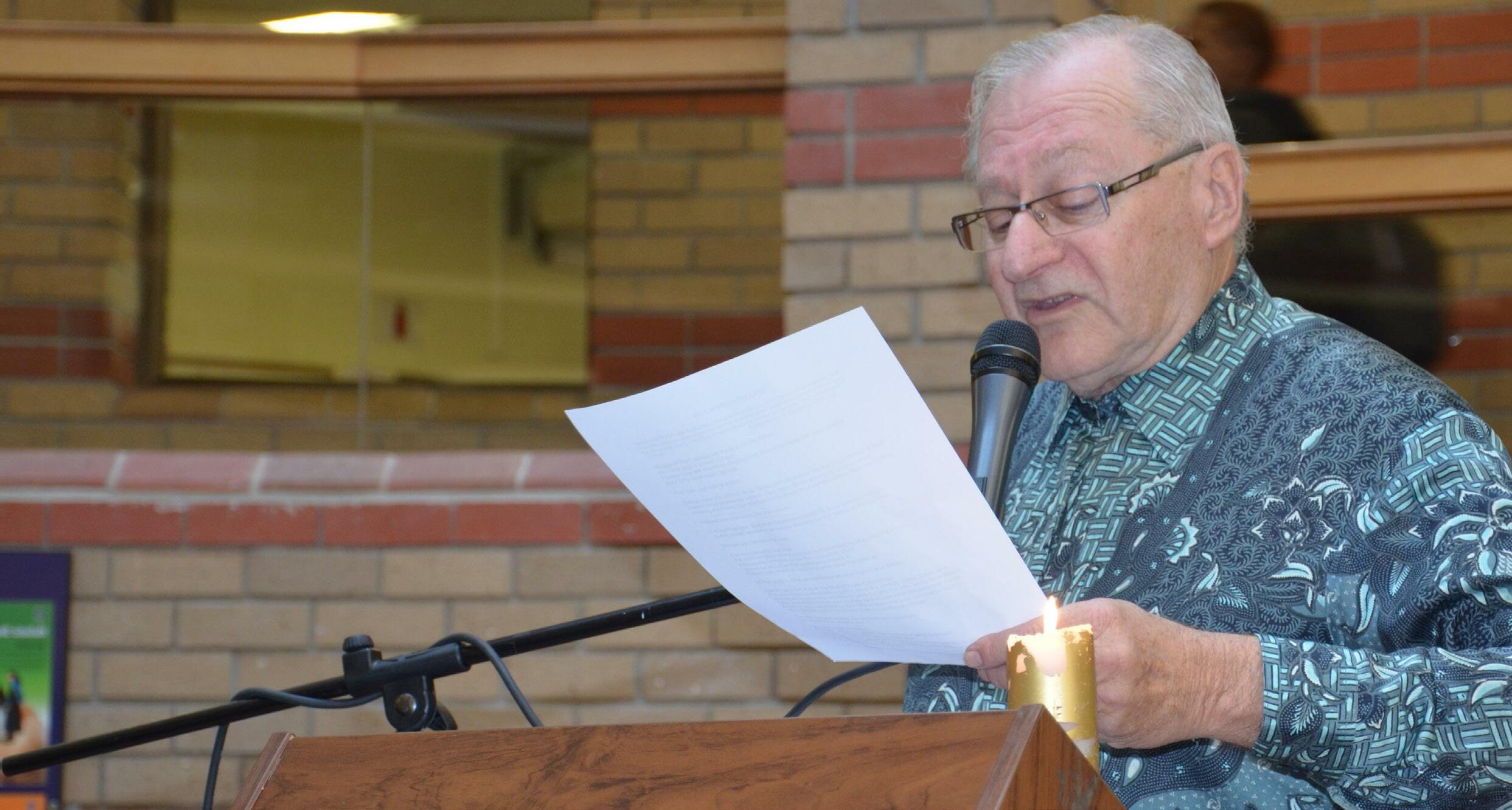
The award was established towards the end of 2021 and the inaugural Keith Gottschalk African Integration Lecture took place on 25 May 2022. The lecture will form part of the university’s Africa Day celebrations. Dr Khabele Matlosa, the Director for Political Affairs at the African Union Commission (AUC) in Addis Ababa, Ethiopia, the keynote speaker on the day. Matlosa’s
address was followed by reflections on Gottschalk’s contribution as a scholar of South African politics. The event will be the first of an annual lecture series aimed at fostering critical dialogue on African integration and related matters.
“One of Mr Gottschalk’s lasting legacies in the Department of Political Studies was his establishment of an academic focus on African politics beyond South Africa,” says Africa.
The department currently has an emerging African Politics study stream. For this reason the award will be used to help build and enhance this area.
“The department extends its gratitude to Ms Dianna Yach, Chairperson of the MFF, for establishing this award,” says Africa.
According to Dr Namhla Matshanda, a Senior Lecturer in the department, current postgraduate Honours projects, Masters theses and PhD dissertations demonstrate a growing interest in this area.
“African Integration is a conceptual idea that allows for empirical investigation and a reading of contemporary trends on issues such as migration and mobility, development, foreign policy and security, to name a few,” adds Dr Matshanda.
As part of operationalising the long-term goals of the award in 2023, Matshanda will teach a postgraduate module on Regional Foreign Politics.
“The need for critical engagement has become more pressing as our continent continues to face historical legacies of colonisation including socio-economic challenges, conflict and political instability. It is also necessary to celebrate and highlight the successes, best practice and achievements emerging from the continent”.
2021 I ANNUAL DONOR REPORT 16
UNITED WAY SOUTH AFRICA GIVES “MISSING MIDDLE” STUDENTS SOME FINANCIAL SECURITY
In 2019, research estimated that the number of missing middle students – “those who are too wealthy to benefit from NSFAS, but who struggle to afford higher education” – amounted to 343 000 individuals. In order for these students to be supported with a full bursary while studying, at least R19.2bn would have to be made available to see this realised.
This burden weighs heavily on the shoulders of many missing middle students at the University of the Western Cape (UWC). Thanks to United Way South Africa (UWSA), that pressure was eased for 24 UWC students who obtained bursaries to cover their tuition fees. Considering the hundreds of students that applied for the bursaries, it is clear that the need for funding is great at the institution.
According to the Donor Relations office, the R472 499 donated by UWSA will financially assist these students who are often excluded from accessing funding from financial aid schemes like the National Students Financial Aid Scheme. This is because their household income exceeds R350 000 per annum.
“Our United Way South Africa (UWSA) Bursary Programme is aimed at providing funding and capacity building opportunities for academically excelling and financially challenged students within the tertiary education sector in South Africa. UWSA has partnered with leading South African universities to identify students that are in urgent need of funding to complete their studies and access the world of work. We are currently supporting four universities in South Africa, of which UWC is one,” explains UWSA’s Executive Director, Ms Chuma Qwalela.
UWSA was established 130 years ago and focuses on creating a “world where all individuals and families achieve their human potential through education, income stability and healthy lives”.
“United Way believes that everyone is entitled to a quality education. We work to make sure people get the support services they need right now while simultaneously addressing the root causes of key issues like access to education and financial stability,” says Qwalela.
“We know that by improving education for all children, we’re setting them on the path to future success as they go on to hold skilled jobs and become financially equipped to support their families. We also know that good health is directly linked to a successful life.”
In 2021, a report compiled by University World News indicated that South African universities’ budgets were cut by R24.6 billion. This was due to the economic impact of COVID-19 on an already faltering economy. In the same financial year, the student debt crisis exceeded R14 billion. Research conducted by Statistics SA in 2021 also indicated that the majority of children and youth in crisis do not have access to the quality of education required to achieve their potential.
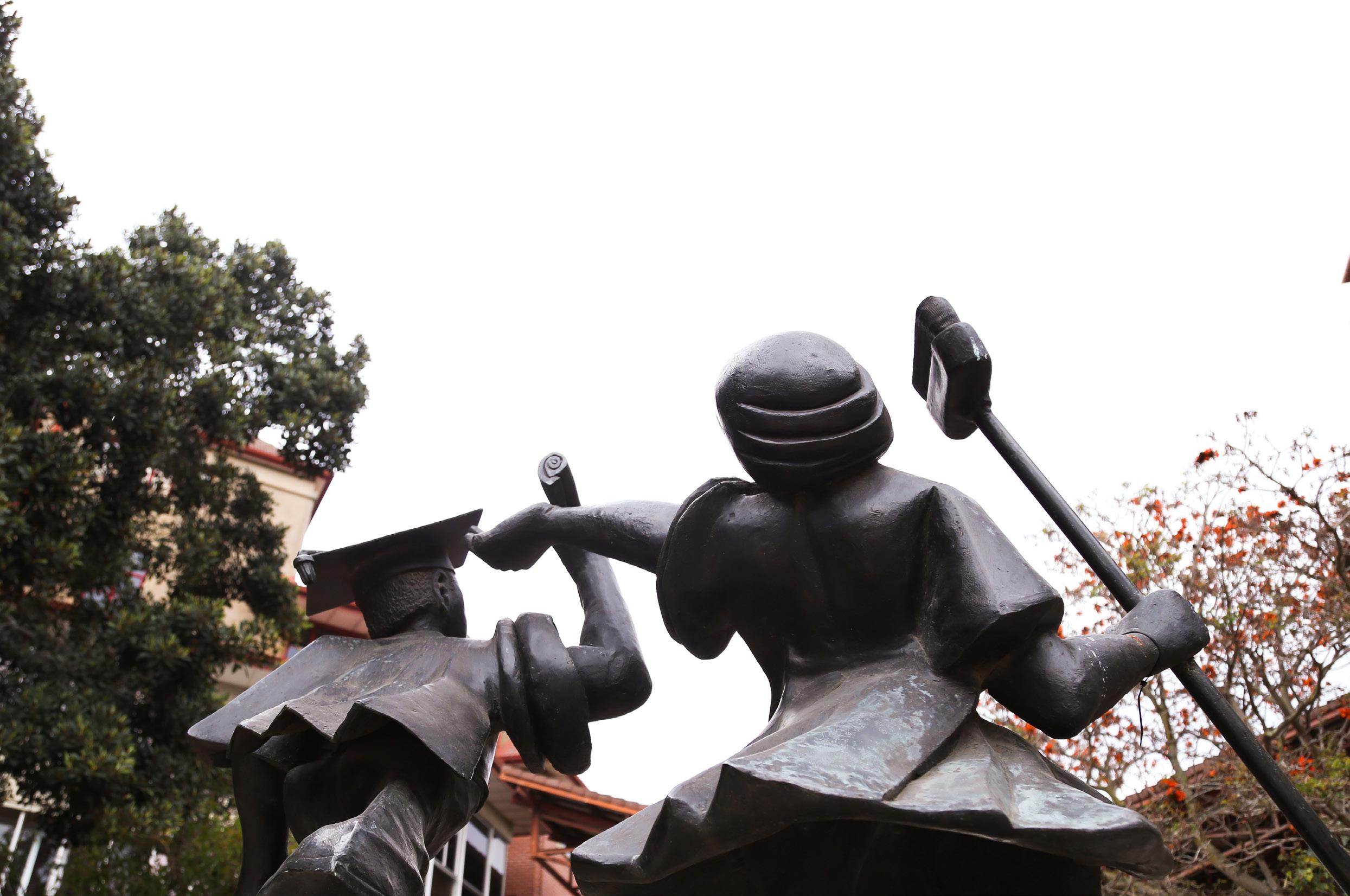
“There is an alarmingly large number of youths that are excluded from the economy due to a lack of skills and industry-recognised qualifications. The South African Census indicates that only 1 in 8 working age adults under 25 years have a job. In addition, 42% of young people are unemployed and have very little chance of gaining stable incomes. This subsequently exposes them to many of the social ills incumbent in their communities,” explains Qwalela.
“By providing students with bursaries, we are ensuring that we have a supply of skills in the form of graduates to meet market demands. UWSA thanks our various corporate sponsors for their continuing support in the fight for healthy, well-educated and financially stable individuals and families. Through collective community impact, we bring about long-term change to communities in need, together. LIVE UNITED.”
17 2021 I ANNUAL DONOR REPORT
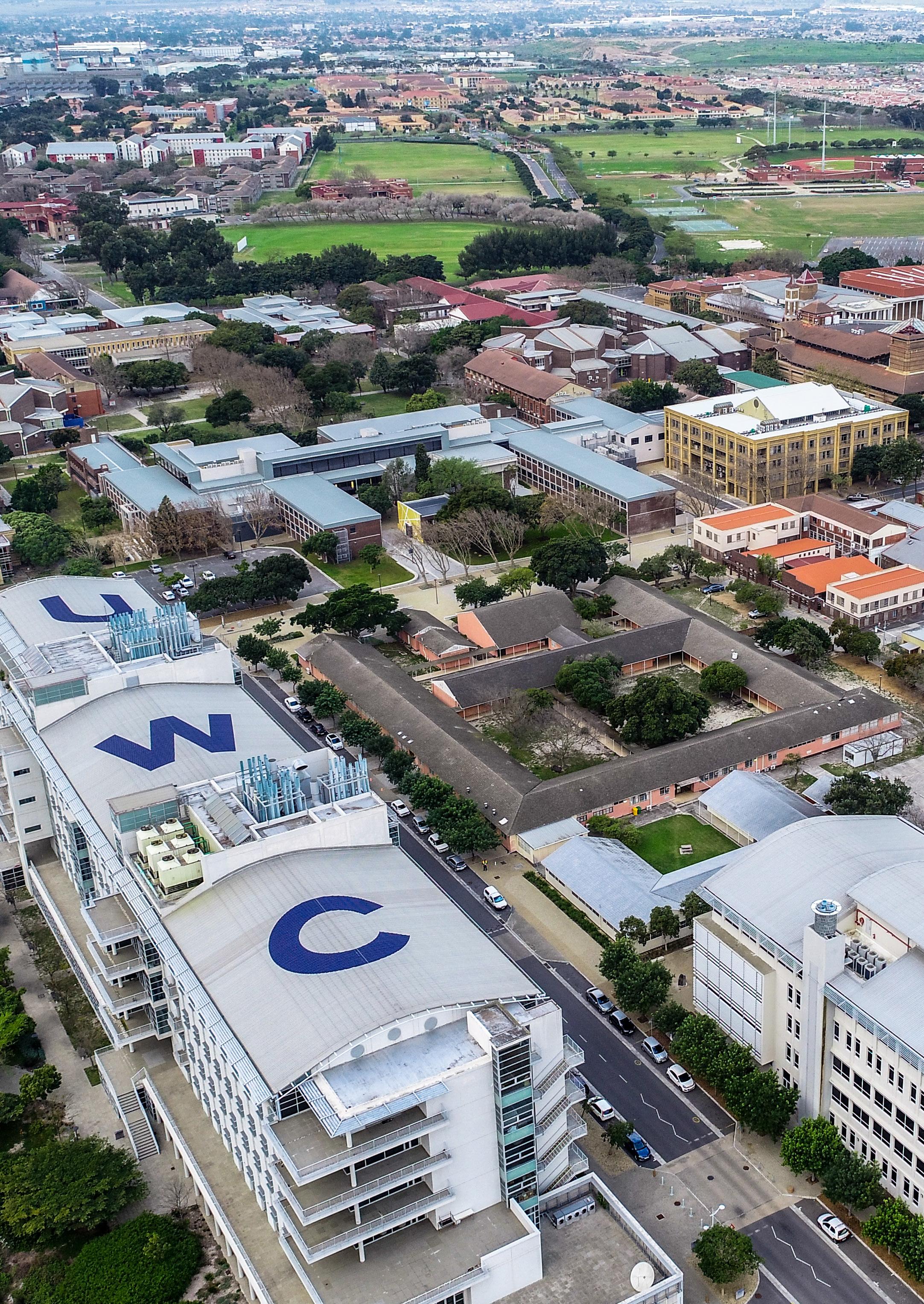
2021 I ANNUAL DONOR REPORT 18
RESEARCH FUNDS HELPS UWC INVESTIGATE SCHOOL-BASED HOMEWORK CLUBS ON TEACHER AND LEARNER WELL-BEING
Research supported by the Norwegian-based Dorothea Steenbuch Foundation will help the University of the Western Cape (UWC) investigate the role that school-based homework clubs play in enhancing learner support and the promotion of teacher and learner well-being.
The study, to which the foundation has donated R90 000, started in 2016 and was meant to continue throughout 2020. However, it came to a standstill in March 2020 when the South African government implemented the first hard lockdown to slow the spread of the coronavirus. All university fieldwork was temporarily suspended and will begin again in 2022.
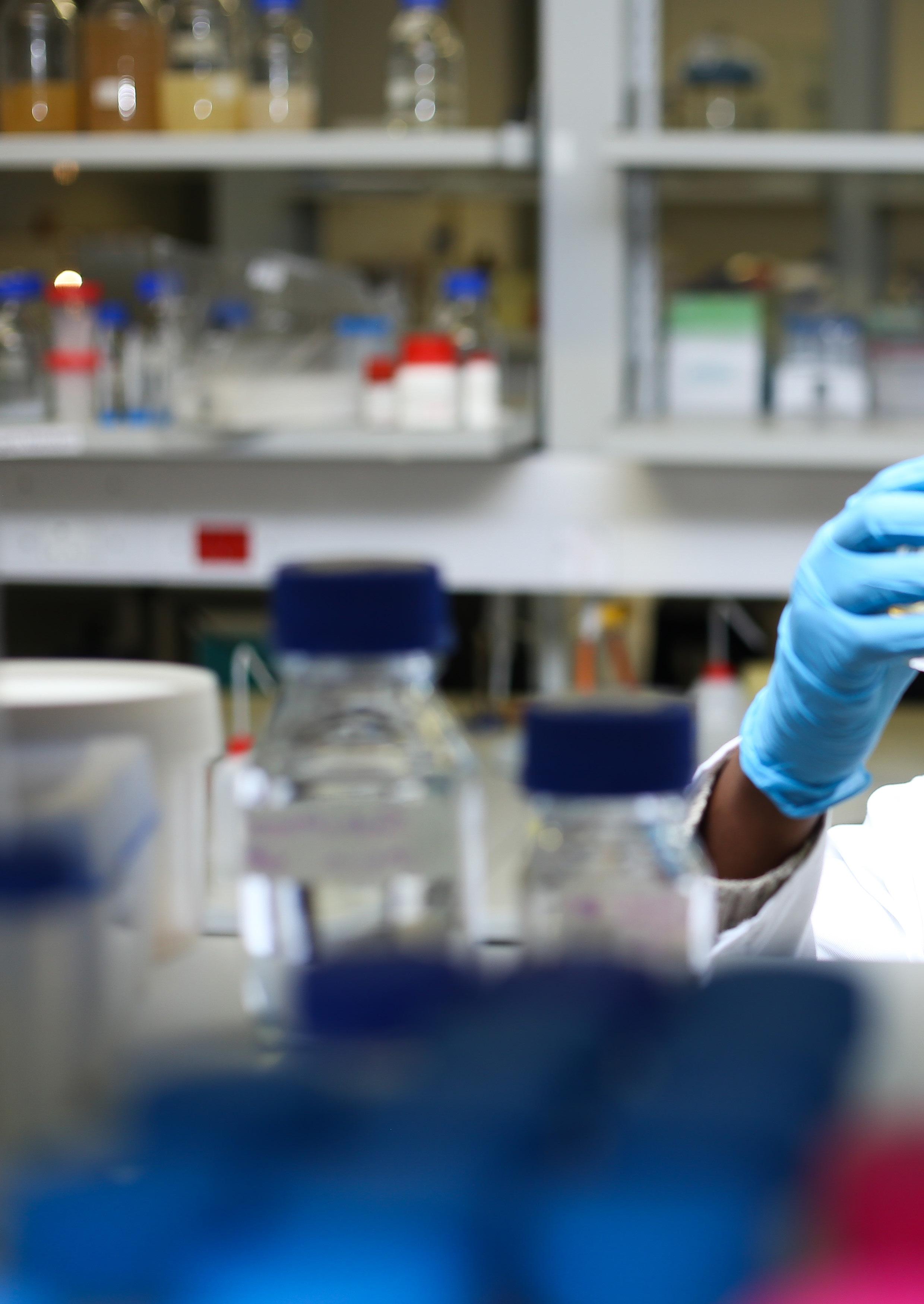
According to Dr Collett this research “will offer valuable insights into models of best practice in establishing and sustaining homework/study clubs in Western Cape public schools and their role in supporting learner inclusion and teacher well-being”.
Other than identifying “best practice” models in running and sustaining homework/study clubs in primary schools, Collett aims to explore what factors motivate learners, teachers, parents/guardians, and community members to support or attend homework/study clubs.
“In addition, we’ll also explore how these clubs support inclusive education practices and enhance learner achievement, and also elicit teacher perceptions of the relationship between homework/ study clubs and the enhancement of their wellbeing,” explains Collett.
Before the first lockdown, Collett had met with Mrs Gloria Sampson, a retired principal of a rural primary school in Wellington who had begun a homework and study club for learners that was run from her home.
Strict lockdowns in 2020 and 2021 had a devastating impact on the education of learners from under-resourced schools and in homes where parents or guardians could not afford internet access. Providing educational support to learners during lockdown conditions proved a great challenge to teachers, parents and learners. The additional support of school-based homework or study clubs either happened online or ceased during this period.
“During lockdown it was really hard for schools to continue with their homework/study clubs. The whole co-curricular programme and the support provided through these programmes basically collapsed in that time,” explains Collett, “with parents struggling to support their children who had to learn from home. Many learners fell behind.”
19 2021 I ANNUAL DONOR REPORT
Research by UNICEF South Africa published in 2021 indicates that learners had already by then fallen behind by “75% and up to a full school year” due to “rotational attendance, sporadic school closures and days off for specific grades”. The latter has led to 54% of learning time being lost. Shockingly, between 400 000 to 500 000 learners have also dropped out of school.
“Yes, teachers were overwhelmed during lockdown. They struggled to get access to learners and to cover the curriculum, while also having to deal with their own personal and family challenges. They needed to find ways to care and support learners, and rapidly adjust to online and blended learning,” explains Collett.
“The support systems for teachers in schools are limited and the demands on teachers both before and during lockdown are great. Workload demands tend to always outweigh job resources.”
Collett acknowledges that “many teachers and school leaders are resourceful and resilient individuals, and did step up phenomenally during the unprecedented health crisis”.
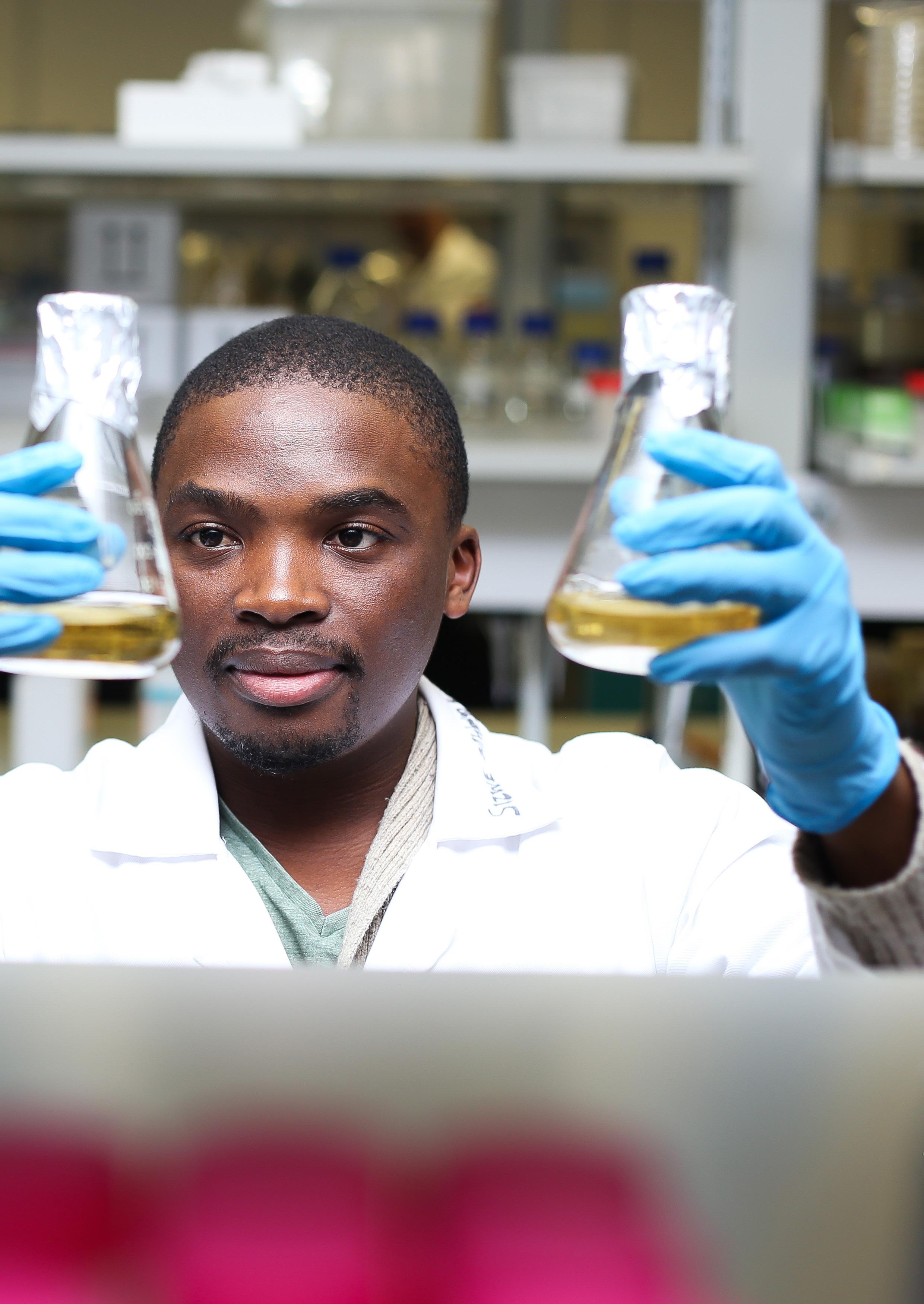
While many extra-curricular programmes such as homework or study clubs stopped functioning during lockdown, teachers tried a range of strategies to support parents and guardians to assist their children. She believes that drawing on these learnings and strengthening homework and study clubs may be one such strategy that can make a difference in building school community partnerships and supporting teacher and learner well-being. Collett’s research will be valuable in informing how systems of support for learner and teacher well-being can be strengthened.
In addition to supporting the funding of this research, the Dorothea Steenbuch Foundation provided bursaries to two young women from Wellington to complete their studies as teachers. Both students graduated as teachers and one of them has played a key role in supporting the Wellington homework club run by Sampson.
Collett has a particular interest in teacher well-being and the development of schools as thinking and learning organisations. Her current research interest focuses on the use of multi-modal pedagogies and online technology to support teaching and learning and the development of student academic literacies.
She also served as the South African Coordinator of an Erasmus Plus partnership that focused on teacher well-being and diversity in collaboration with higher education institutions and schools in Norway, Denmark and Ireland. Outcomes of this research included academic publications; the building of strengthened capacity to support teacher well-being in the project school and the production of a free online resource on enhancing teacher well-being for teachers, school leaders and support providers. A free copy of this resource and other resources related to supporting teachers’ well-being can be accessed at https://sites.google.com/view/ teacherwellbeingdiversity/home.
Once the current study is complete, Collett will be sharing the findings through research papers in accredited local and international journals, regionally with the Western Cape Education Department’s Directorate: Inclusive and Specialised Education Support; and nationally on forums such as the Community of Learning Principals and through conference presentations.
2021 I ANNUAL DONOR REPORT 20
UWC STAFF DONATE NEARLY R1 MILLION TO STUDENT SUPPORT
Staff at the University of the Western Cape (UWC) have donated nearly R1 million to address issues around student access and equity. Over the last five years 571 staff have contributed a total of R971 994.02.
“The University of the Western Cape personifies hope and resilience with a proud legacy of social activism that remains deeply rooted within our “communities”.
“Staff and students always rally around a common cause, whether in relation to academia, policy issues or the current burning issue of access to higher education,” says Mrs. Vera Adams, Manager: Fundraising and Donor Relations within Department for Institutional Advancement.
According to Adams, many staff members are graduates and parents of former and current students, so “they are highly aware of the financial challenges that students face, as well as the personal and academic risks that they face if they are underfunded”. The student-led campaign “#AccesstoSuccess”, was launched in 2016 to assist students who excel academically but cannot afford university tuition. The ongoing campaign is managed by the Alumni Relations Office and kicks off with the annual staff campaign each year. The aim of the campaign is to encourage staff members to continue giving and to sign-up new staff donors.
“Thanks to the generous support of all donors, UWC can offer more bursary support programmes, improve teaching and learning facilities and provide additional academic support services to ensure that no “student is left behind”, says Adams.
According to Mr. Niven Maree, UWC Alumni Relations Manager, staff are not only restricted to making financial contributions, but are encouraged to actively participate in other activities at UWC.
“One key focus area that we would love to see more of our alumni communities become involved in is the area of mentorship of our young alumni as well as affording our recent graduates and young grads internship opportunities at businesses that are alumni-led,” says Maree.
“There has been an incremental increase in the type of support from our alumni population, however with many of our alumni having been impacted by the COVID-19 pandemic, this admittedly inhibited the extent or their ability to provide financial support to the university’s initiatives. We are confident that the levels of benevolence from our alumni constituencies will improve with time,” Maree explains.
Mrs. Awaatief Daniels, a staff donor working as a Donor Relations Prospect Researcher in the university’s Donor Relations Office, says that individual donations have become critical, especially following the impact of the pandemic.
“No matter how small a donation is, it has a substantial impact on a wide range of university activities. Every donation helps UWC to provide financial aid, build food security programmes and supply computers and data to disadvantaged students,” she says.
Like many other staff at UWC, Daniels is humbled to be able to make a small contribution to enrich a student’s life, not only financially, but also by lightening their load to give them hope for the future.
“I want to help advance the course of UWC to continue beyond my passing one day. Giving to UWC is not a mere act of hackneyed philanthropy. But to help students cope financially is to help them have hope, like I was given hope by this university and my lecturers,” says Daniels.
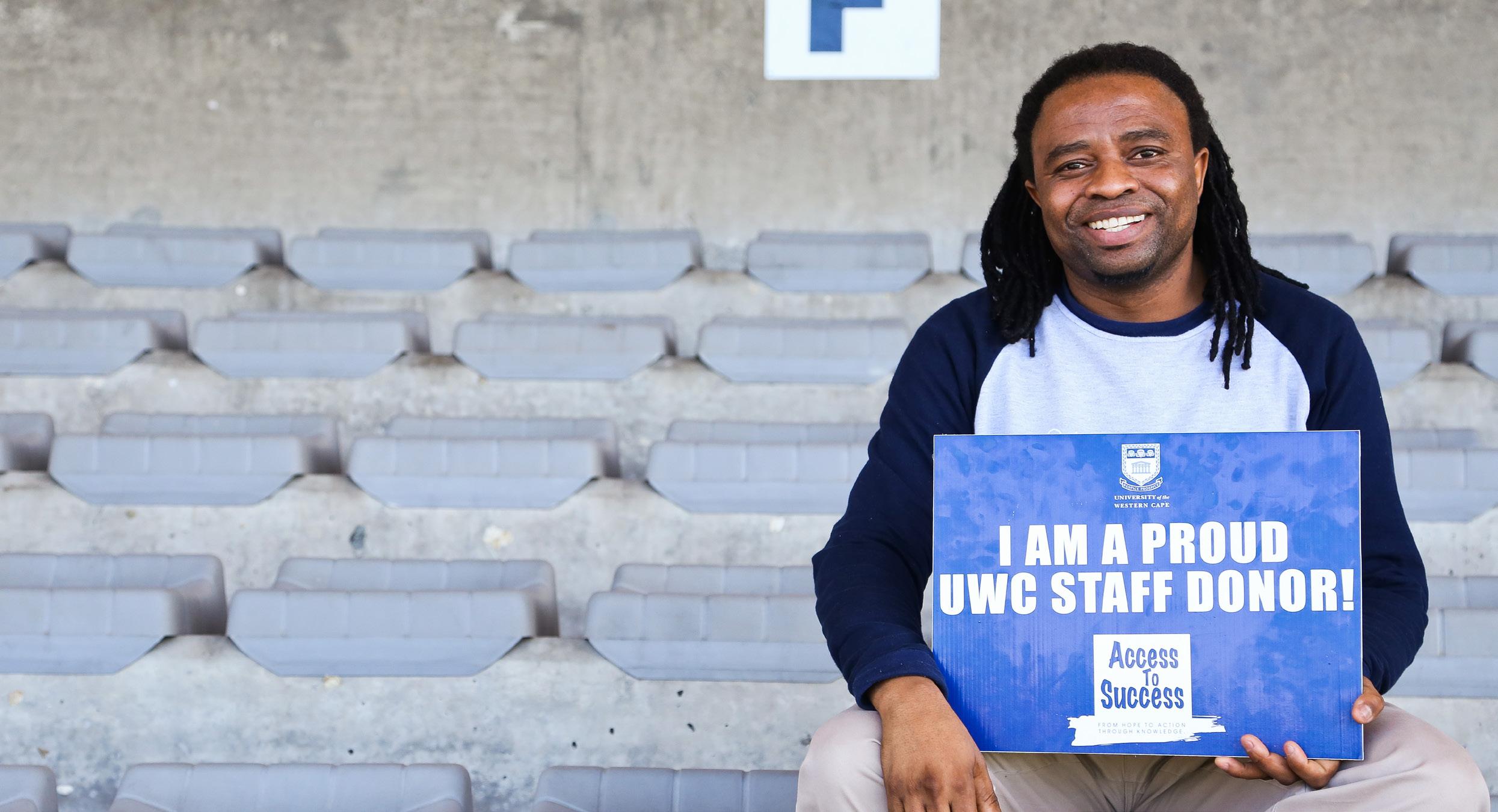
21 2021 I ANNUAL DONOR REPORT
Donor
FUNDING SUMMARY ACROSS SECTORS
DONOR
with
Part of the mandate of the Department for Institutional Advancement at the University of Western Cape (UWC) is to mobilise resources to sustain the mission of the university. This involves promoting the institution’s public profile, maintaining beneficial relationships
government, corporate and alumni stakeholders, and assisting and facilitating the fundraising efforts of the university community. A concerted effort by the department and the valued contributions of the whole UWC community, including faculties, students and alumni, resulted in a satisfactory inflow of resources from donors.
Type Amount Corporate R4 416 091,27 Foundation R2 881 270,00 Individual R322 215,06 International Donor R11 445,00 Non-Profit Organisation R472 499,33 SETA R19 867 852,23 Trust R7 008 962,24 Total R34 980 335,13 Project Type Amount Community Projects R2 801 370,00 Endowment Fund R1 439 900,00 Financial Aid R22 720 881,33 Infrastructure R6 000 000,00 Sport R14 950,00 Teaching/Learning Support projects R2 003 233,80 Total R34 980 335,13 2021 I ANNUAL DONOR REPORT 22 2021 INSTITUTIONAL PERFORMANCE DEPARTMENT FOR INSTITUTIONAL ADVANCEMENT 2021
TYPES OF FUNDING TYPE OF
PROJECT TYPE CORPORATE COMMUNITY PROJECTS INTERNATIONAL DONOR INFRASTRUCTURE FOUNDATION ENDOWMENT FUND SETA SPORT TRUST INDIVIDUAL FINANCIAL AID NON-PROFIT ORGANISATION TEACHING/ LEARNING SUPPORT PROJECTS 13% 8% 0% 17% 8% 4% 57% 0% 20% 1% 65% 1% 6%
Corporate Sector Funding
ABSA Bank (Pty) Ltd Old Mutual Corporate
Absa Capital Limited Open Communications Eyona (Pty) Ltd
Aluwani Capital Partners (Pty) Ltd Open Space Consultants t/a Southern Hemisphere
Argon Asset Management Park Central Commercial (Pty) Ltd
Bidvest Data Peninsula Beverage Company (Pty) Ltd
Bidvest Services (Pty) Ltd. t/a Bidvest Prestige
Bisset Boehmke McBlain
Pienaar Brothers (Pty) Ltd
Ponahalo Capital (RF) Proprietary Limited
Boshard Construction Power-On Investment Holdings (Pty) Ltd
De Beers Group Securitas SA (Pty) Ltd
Dell Development Fund Shoprite Holdings (Pty) Ltd
Garden Cities/Archway Foundation
General Reinsurance Africa Limited
Steyn Capital Management (Pty) Ltd
Talani Quantity Surveyors (Pty) Ltd
Huawei Technology Access Group (Pty) Ltd
Iliso Consulting (Pty) Ltd
The Foschini Group Limited
Camissa Asset Management (Pty) Ltd Tiger Brands Limited
Mazars Totalgaz Southern Africa (Pty) Ltd
Mediclinic Southern Africa (Pty) Ltd Toyota South Africa Motors (Pty) Ltd
Mergence Investment Managers Value Capital Partners (Pty) Ltd
New Clicks South Africa (Pty) Ltd
Total Received R4 416 091,27 23 2021 I ANNUAL DONOR REPORT
Trusts and Foundations
Bradlow Foundation
Bushell Charitable Trust
E.J. Lombardi Trust
GA Kuhn Testamentary Trust
Hillensberg Trust
Lind Family Trust
Link SA Fund for Tertiary Education Trust
Myra Chapman Education Trust
Solomon Ruben and Ann Winer Educational and Benefit Trust
The Abe Bailey Trust
Total
The UWC Development Fund
Morta, Vincent (Mr)
Solomon Ruben and Ann Winer Educational and Benefit Trust
The Albert Wessels Trust
The Jakes Gerwel Educational, Endowment and Development Fund
Baatjies, Shelley-Ann Hendriena (Mrs)
Chikane, Chikane Albert (Mr)
Gibbs, George Cambell (Mr)
Koopman, Nico Norman (Prof)
Funding
The Ackerman Family Educational Trust Fund
The Albert Wessels Trust
The Foundation to Promote Open Society
The Fred J Robertson Foundation
The Lily Ashton Education Trust
The Mauerberger Foundation Fund
The New Settlers Foundation
The Overbeek Trust
The Susman Charitable Foundation
The Susman Charitable Foundation
Toyota South Africa Motors (Pty) Ltd
Phillips, Jacobus Francis (Rev)
Samuels, Joseph Sannie (Mr)
The Fred J Robertson Foundation
Received R9 890 232,24 2021 I ANNUAL DONOR REPORT 24
Donations to Student Financial Aid
Abbas, Tafseer (Mr) Martin, Penelope (Dr) Abdoll, Gerald Steve (Dr)
Mazars
ABSA Bank (Pty) Ltd Mcghie, Venicia Flora (Dr)
ABSA Capital Mediclinic Southern Africa (Pty) Ltd Alexander, Eugene Henri Regan (Mr) Mehl, Ralph Graham (Mr)
Aluwani Capital Partners (Pty) Ltd Mercuur, Karlene Heloise (Mrs) Andipatin, Gretna Sigrid (Ms) Mergence Investment Managers
Argon Asset Management Mhlambiso, Rosalind Lwazikazi (Miss)
BANKSETA Higher Education Mia, Shanaaz Christine (Judge) Barnes, Somayah (Mrs)
MICTSETA Bastian, Rene Minette (Dr) Mngcwengi, Bongeka (Miss) Bennett, Monique Belinda (Ms) Mnyaka, Phindezwa Elizabeth (Dr) Bessick, Jacqueline Ruby (Ms) Molefe, Mpho Gideon (Mr) Beyene, Yephtahe Moosa, Zerina (Ms)
Bidvest Data Morris, Tracy Chelestine (Mrs) Bidvest Services (Pty) Ltd t/a Bidvest Prestige Mpulu, Nyameko (Mr) Bisset Boehmke McBlain Mqingwana, Zazi Khanyisa (Mr) Bock, Gaynor Athalia (Ms) Mshweshwe, Modiegi Cynthia (Mrs) Bonani, Khwezi (Mr) Mushipe Kosi, Thembisa Selda (Mrs) Borchjes, Alison Jennifer Margaret (Ms)
Myra Chapman Educational Trust Boshard Construction Mzoneli, Angel Hlengiwe (Ms) Bostander, Emerancia (Ms) Naude, Lorna Elizabeth (Ms) Bradlow Foundation Nayo, Songezo Lubabalo (Mr) Brijlal, Priscilla (Mrs) Neerputh, Shirlene (Dr) Brown, Vanessa (Dr) New Clicks South Africa (Pty) Ltd Buys, Johannes (Mr) Njenga, James Kariuki (Dr) Cagwe, Lizo Patrick (Mr) Ntobongwana, Fika (Mr) Charles, David (Mr) Nyingwa, Sindiswa Enid (Ms)
Claims, Ivan Prins (Mr)
Old Mutual Corporate Coetzee, Mandy (Ms) Open Communications Eyona (Pty) Ltd Couert, Shameega (Ms) Open Space Consultants t/a Southern Hemisphere Cupido, Laurian Bronwin (Ms) Park Central Commercial (Pty) Ltd Cupido, Wynoma (Ms) Parker, Hameedah (Miss) Damons, Lynne Nesta (Dr) Parker, Nazrana Begum (Ms) Daniels, Awaatief (Ms) Pather, Sathasivan Indiran (Prof) Daries, Genevieve (Ms) Peck, Amiena (Ms)
De Pinto, Marcell (Mr) Peinke, Hadjira (Mrs)
De Visser, Jacobus Wilhelm (Prof) Peninsula Beverage Company (Pty) Ltd Dell Development Fund Permall, Laetitia (Mrs)
Dell South Africa Petersen, Fazlyn (Dr) Dippenaar, Lois (Mrs) Petersen, Felicia Dawn (Ms)
Du Plessis, Belinda (Mrs) Pienaar Brothers (Pty) Ltd Dykes, Glynnis Zena (Dr)
Plaatjies, Asanda Alex (Mr)
E.J. Lombardi Trust Platzky, Laurine (Dr) Esau, Cecyl (Mr) Pokpas, Keagan (Mr) Espin, Mark (Mr) Poopedi, Mathipa Nelson (Mr) Everts, Felicity (Ms) Power-On Investment Holdings (Pty) Ltd
25 2021 I ANNUAL DONOR REPORT
Donations to Student Financial Aid
February, Zahra (Ms)
Pretorius, Tyrone Brian (Prof) Fish, Washeela (Dr) Prins, Brian Jeffrey (Mr) GA Kuhn Testamentary Trust Ravjee, Neetha (Dr) Garden Cities/ Archway Foundation Rhoda, Anthea Joy (Prof) Gelderbloem, Charles Samuel (Mr) Rink, Bradley Michael (Dr) Gelderbloem, Lorne (Mrs) Sadien, Essa (Mr) General Reinsurance Africa Limited Saule, Mthetheleli Buhle (Mr) Goliath, Cardre (Miss) Scott, Raymond Rudolf (Mr) Gwadiso, Sapho (Mr) Securitas SA (Pty) Ltd Hene, Boniswa Debbie (Miss) Sehowa, Nelly Mokgadi (Dr) Henney, Andre (Mr) Senekal, Janine (Mrs) Henney, Gordon Kelly (Mr) Shanjengange, Melissa Agnes (Mrs) Henney, Robert Cecil Alfred (Judge) Shoprite Holdings (Pty) Ltd Heylen-Essop, Nadia (Ms) Short, Suzanne Andrea (Ms) Hillensberg Trust
Sias-Oerson, Mayverine Iris (Ms) Hleza, Fundiswa Lovedalia (Mrs) Simmers, Nolan Mitchell (Mr) Huawei Singh, Anesh Maniraj (Prof) Huckle, Charmaine Vida (Mrs) Siyengo, Linda (Mr) Iliso Consulting (Pty) Ltd Solomon, Sandra Johanna (Mrs) Isaacs, Joyene Sirene (Ms) Steyn Capital Management (Pty) Ltd Jacobs, Cheslyn Lionel (Mr) Talani Quantity Surveyors (Pty) Ltd Jeftha, Bentley (Mr) Technology Access Group (Pty) Ltd Jeremiah, Bridget Lungiswa (Ms)
The Ackerman Family Educational Trust Fund Johannes, Peter (Mr)
The Foschini Group Limited Jooste, Deidre Merle (Ms) The Lily Ashton Education Trust Jurgens, Eunice Sarah (Ms)
The Mauerberger Foundation Fund Camissa Asset Management (Pty) Ltd
The New Settlers Foundation Kenny, Igshaan (Mr)
The Overbeek Trust Khan, Saadika Begum (Dr) Thusi, Sibusiso Rodney Evans (Mr) Kippie, Mogamat Yunus (Mr)
Tiger Brands Limited Klein, Maretina (Mrs)
Totalgaz Southern Africa (Pty) Ltd Kleinhans, Laetitia Roslind (Ms)
Triambak, Smarajit (Mr) Kulu Manzi Projekt Tshivhase, Mmboneni Gifty (Dr) Kwinana, Pakamisa (Mr)
Tsolekile-De Wet, Pamela (Mrs) Latchman, Bashkar (Mr) Tucker, William David (Mr) Lawton-Misra, Nita (Dr) United Way South Africa Leonie, Biondello (Mr) Value Capital Partners (Pty) Ltd Lesch, Bersan Jesmal (Mr)
Van Wyk, Steward (Prof) Lewis, Desiree Anne (Prof) Wanza, Brenda Joyce (Ms) Link SA Fund for Tertiary Education Trust Weston, Denise Charmaine (Ms) Links, Carlo (Mr) Willemse, Chontrelle (Dr) Louw, Lionel Ronald (Mr) Wilson, Vivienne Julia (Prof) Louw, Nicola Deborah (Mrs) Wrankmore, Andrew Edward (Mr) Maarman, Rouaan Francois Alexander (Prof) Xulubana, Vuyani Mncedisi Patrick (Mr) Magida, Meko Ernest (Mr) Yasin, Saudiqa (Ms) Marais-Martin, Moira Antoinette (Mrs)
Zimri, Hirschelle (Miss) Marshall, Delia Elizabeth Stuart (Prof)
2021 I ANNUAL DONOR REPORT 26
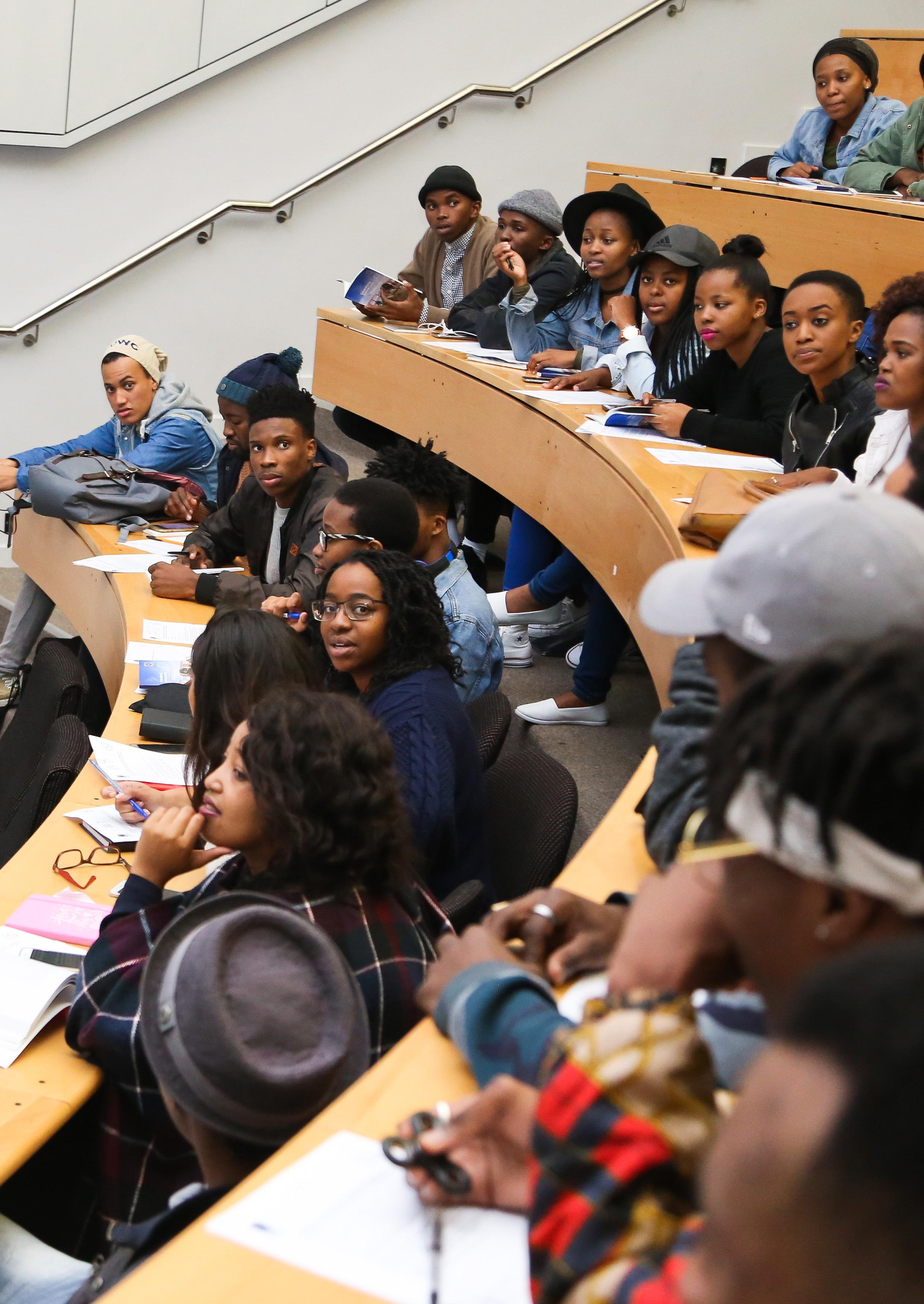
27 2021 I ANNUAL DONOR REPORT
Donations to #NoStudentWillBeLeftBehind campaign
Anciano, Fiona Mary (Dr)
Hendricks, Dorothea Cathy Millicent (Ms) Arnolds, Henry Simon (Mr) Lind Family Trust Bapoo, Rafik Ahmed (Mr) Maree, Niven (Mr) Barrie, Robert Brian (Dr) Mwambene, Lea (Dr) Bassett, Susan Hilda (Dr) Oyowe, Oritsegbubemi (Dr) Bester, Dudley (Mr)
Padmanabbanunni, Anita (Dr) Bock, Susanne Elizabeth (Dr) Petersen, Felicia Dawn (Ms) Brinders, Cay-Lynn (Ms) Ponahalo Capital (RF) Proprietary Limited Burton, Troy Wendell (Mr) Powan Voigt, Justine (Mrs) Bushell Charitable Trust Prinsloo, Nigel Alfred (Mr) Chetty, Rajendra Rabe, Marlize (Prof) Couert, Shameega (Ms) Rajkaran, Anusha (Dr) Daniels, Gayle Marlise (Ms) Schroeder, Jeanine Josephine (Mrs) Daries, Genevieve (Ms) Simpson, Marquard Franklin (Mr) Davids, Glenda (Ms) Snyders, Teresa (Ms) De Beers Group Solomon, Sandra Johanna (Mrs) De Lima, Teresa (Mrs) Symonds, Renee (Ms) Fredericks, Anita Rachelle (Mrs) Thaver, Beverley Martha (Prof) Gelderbloem, Lorne (Mrs) Van Der Schyff, Shanaaz (Mrs) Gibbons, Mark John (Prof) Ward, Kim (Dr) Hamza, Enayatulla (Mr)
2021 I ANNUAL DONOR REPORT 28
HOW TO SUPPORT DEVELOPMENT AT THE UNIVERSITY OF THE WESTERN CAPE
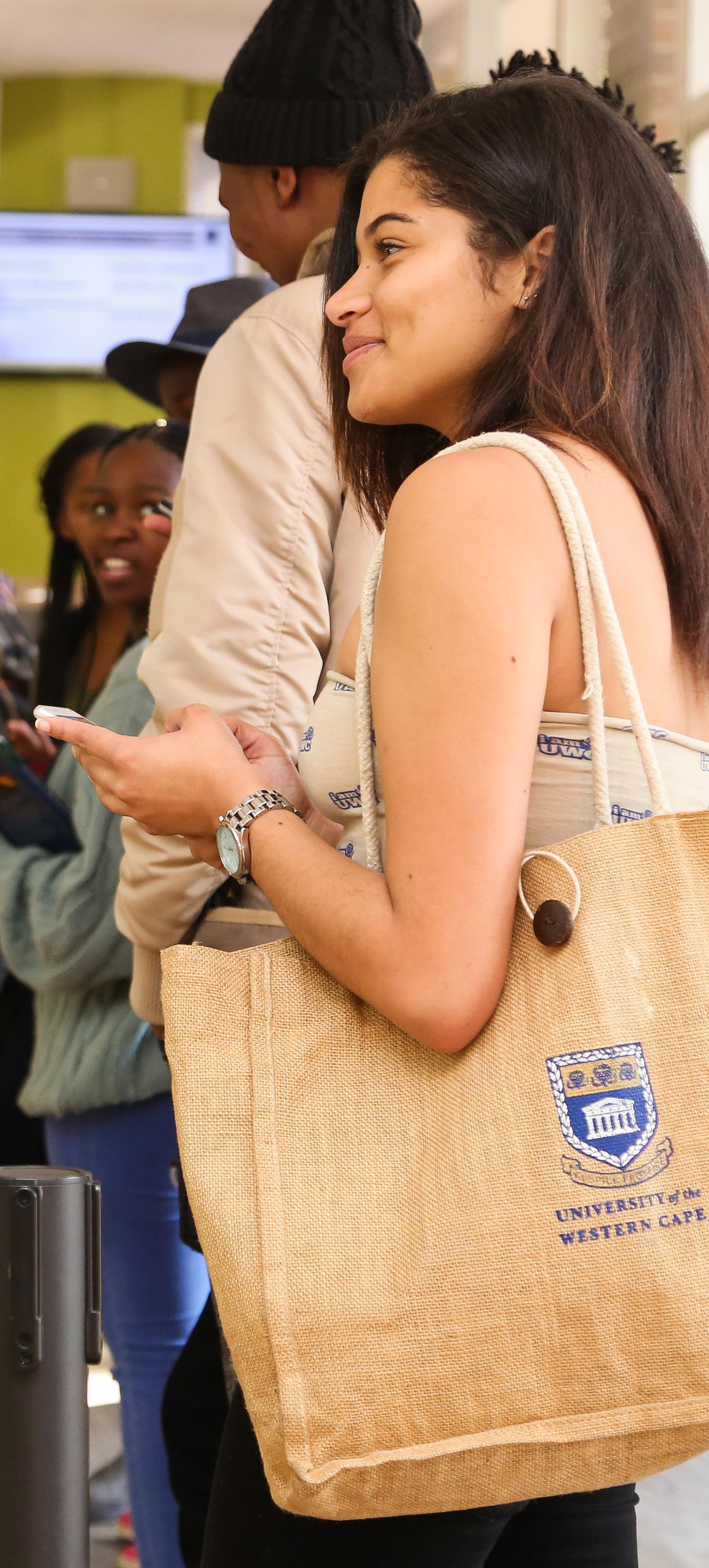
The University of the Western Cape (UWC) strives to be Africa’s best research-led university. We have made considerable strides towards achieving this goal and, in doing so, have provided a quality education to thousands of young South Africans who have gone on to make significant contributions to this country and the world. We could not have achieved so much without the generosity of the individuals, businesses and organisations that invest in our students, programmes and institution to help the university maintain and improve its offerings.
The university has many donation options available for donors should you wish to support us. These include public-private partnerships in the development of infrastructure, research collaboration, training and development, capacity-building, and skills development. You can also help fund the university’s sustainability by contributing to the UWC Jakes Gerwel Educational, Endowment and Development Fund, which is UWC’s long-term investment fund administered by the UWC Foundation.
ALTERNATIVELY CONTACT:
Ms Vera Adams
Manager: Fundraising and Donor Relations E-mail: vadams@uwc.ac.za
All donations to UWC are tax deductible in accordance with Section 18A of the Income Tax Act, Act 58 of 1962.
If you would like to support UWC by making an online donation, please visit us at http://uwc.devman.co.za/Devman/web/giving.
BANKING DETAILS FOR DONATIONS VIA EFT
Account Name: University of the Western Cape Name of Bank: Absa Bank Branch: Epping Branch Code: 560810 Account No: 4050893930
Reference: Name of Donor Swift Code: ABSAZAJJ
Please e-mail proof of payment to Mr Essa Sadien at esadien@uwc.ac.za.
Should you have any questions or queries regarding donation options, please contact Mr Essa Sadien at the e-mail above or telephonically at +27 21 959 3141.
We thank you for your interest and donation to UWC.
Prospective donors can contact the UWC Fundraising and Donor Relations Office: +27 21 959 3904 / +27 21 959 2627.
29 2021 I ANNUAL DONOR REPORT
























